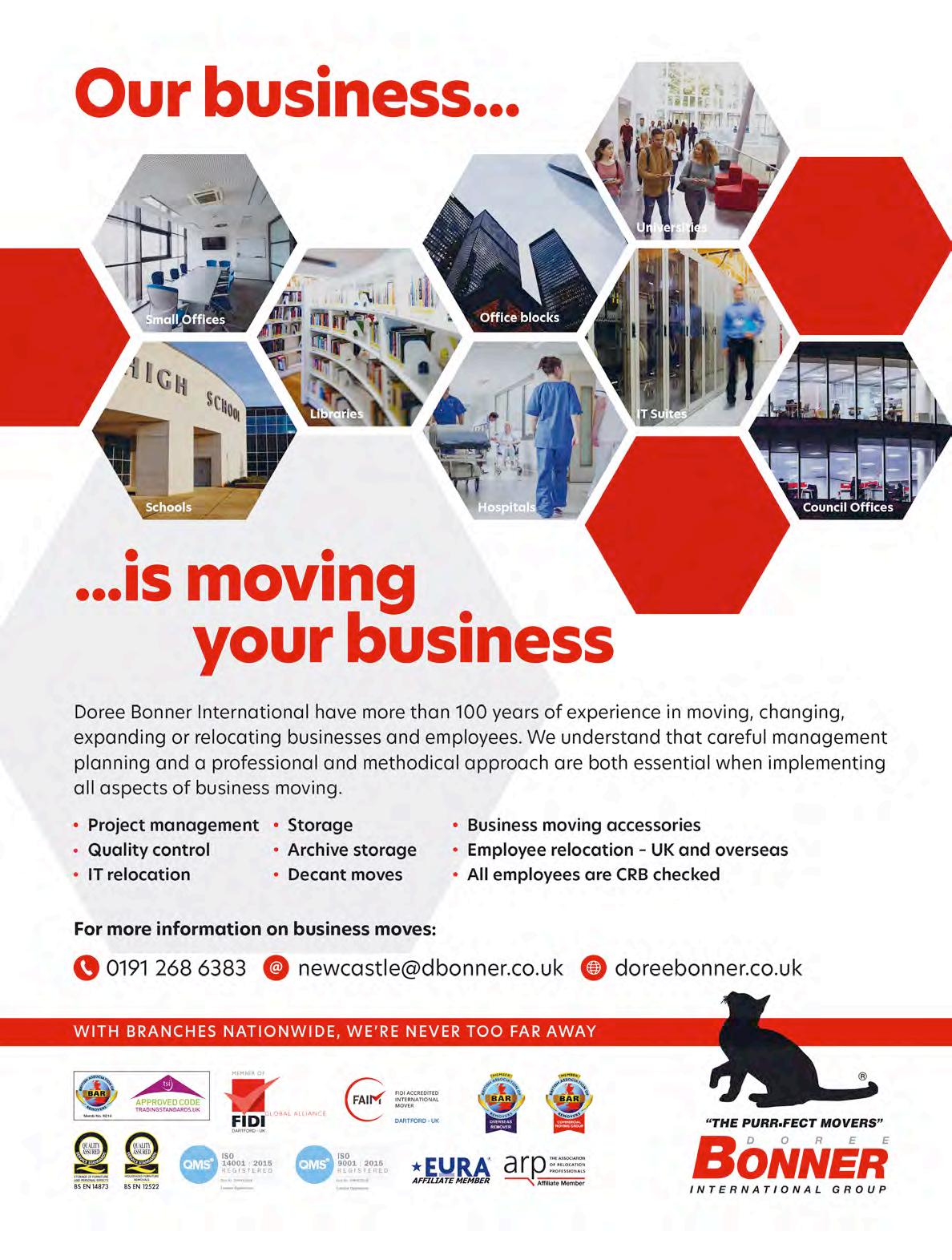ON
LOUIS TAYLOR BRITISH BUSINESS BANK


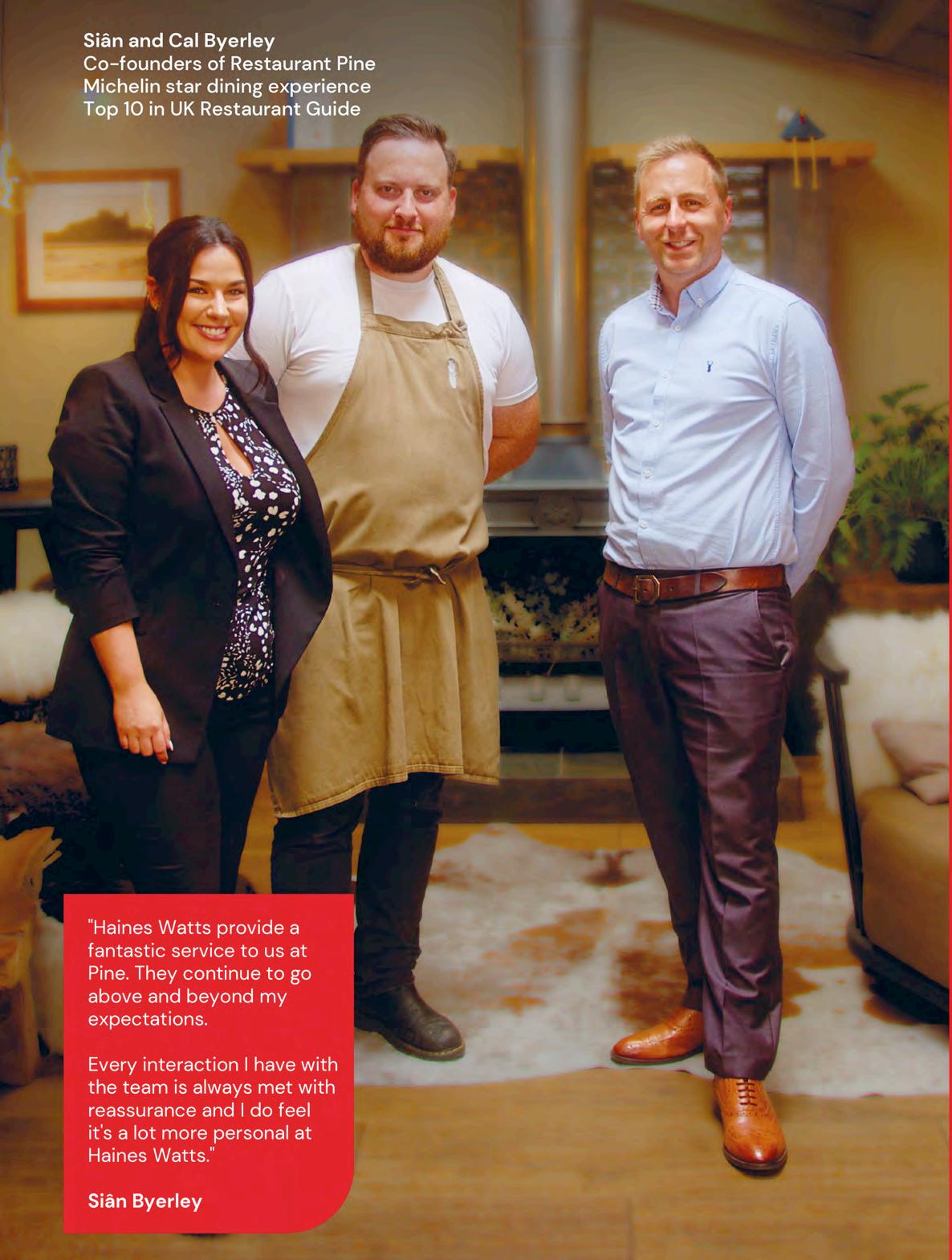
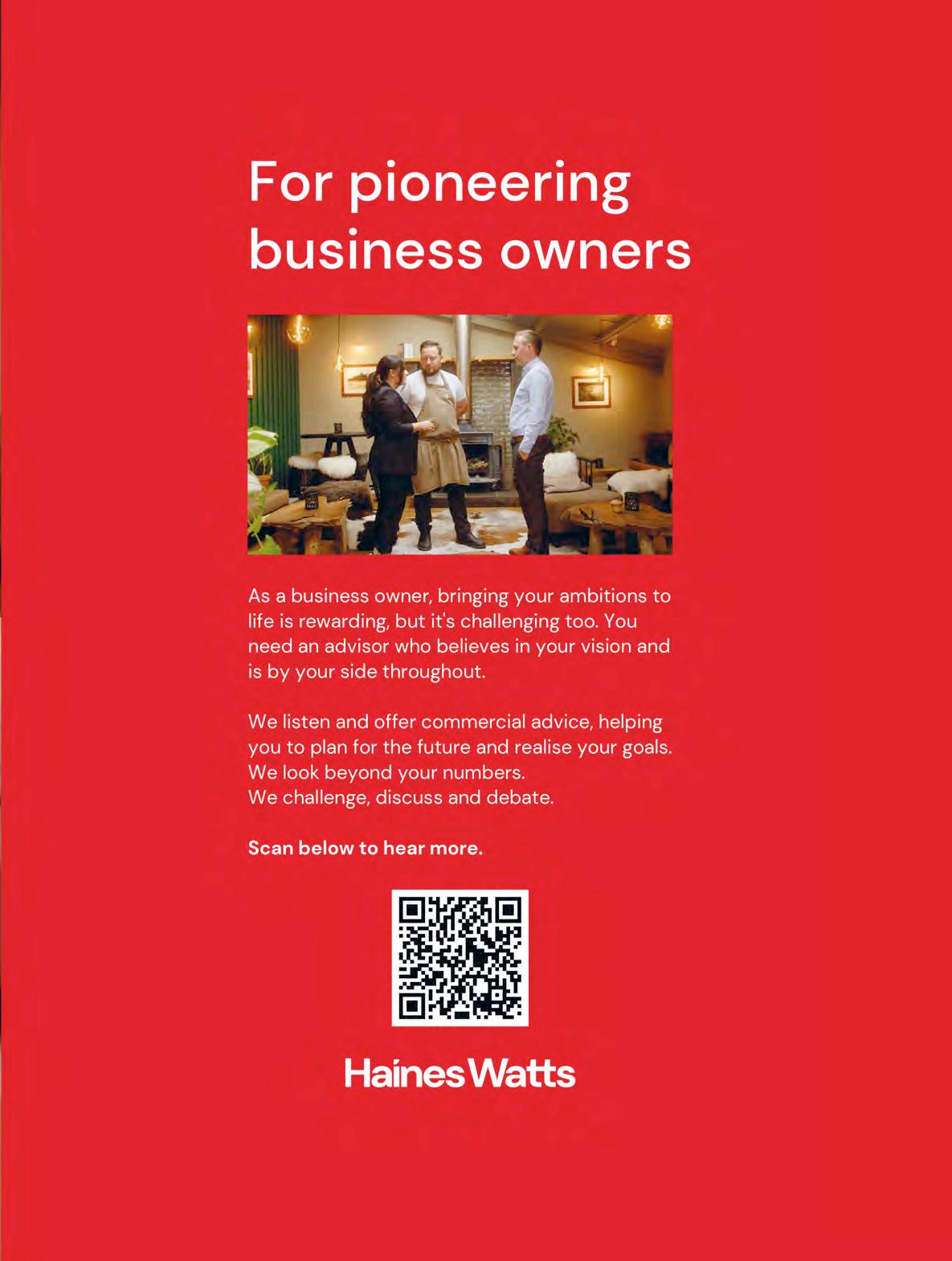


Editor
Steven Hugill steven@netimesmagazine.co.uk
Business journalist
Colin Young
T: 07808 974 533 colin@netimesmagazine.co.uk
Business development director


John Duns
T: 07920 152 523 john@netimesmagazine.co.uk
Creative & managing director
Peter Mallon
T: 07590 064 800 pete@netimesmagazine.co.uk
Partnership & marketing manager




Chloe Holmes
T: 07493 555 509 chloe@netimesmagazine.co.uk
Accounts
Jill Brown jill@netimesmagazine.co.uk
Filmography
Andrew Lowe andrew@netimesmagazine.co.uk
Contributors:
Kris Wadrop
Professor Ian Green
Richy Almond
Sarah Bentley
Julie Pickett
Photography: Ben Benoliel www.benbenoliel.com
Lee Scullion www.leescullion.com
Christopher Owens www.christopherjamesowens.co.uk
Mike Sreenan www.michaelsreenan.com
Angela Carrington Krzysztof Furgala
Jason Thompson www.thisisthebiggerpicture.co.uk
Jay Dawson
Jamie Haslam www.roamwithus.co.uk
Head office
0.09 PROTO, Baltic Business Quarter, Abbot's Hill, Gateshead, Tyne and Wear, NE8 3DF
All rights reserved. Reproduction, in whole or in part without written permission, is strictly prohibited.
Circulation:
To confirm our circulation please contact Andrew Dunn, Stephens and George Print Group, email: andrew.dunn@stephensandgeorge.co.uk
To amend your mailing address or remove yourself from our mailing list contact chloe@netimesmagazine.co.uk
Contact: @NETimesmagazine www.netimesmagazine.co.uk
Photography:
All photos taken by North East Times staff are copyright North East Times Magazine Ltd, and are taken solely for use in North East Times Magazine or products published by North East Times Magazine Ltd.
If you wish to use or publish a photograph taken for North East Times, please contact pete@netimesmagazine.co.uk
Advertising charges: There is a £25 charge for every set of amendments, following the first initial set of amendments, which is free of charge for adverts designed by North East Times Magazine Ltd.
Cancellations: If an advert is cancelled by the booker within a seven day period prior to our print deadline, the advert will be charged in full, plus VAT.
Editorial:
Editorial must be received by the 9th of the month or no responsibility is accepted for errors. The opinions expressed in this issue are not necessarily the views held by North East Times Magazine Ltd.
Advertisements:
Although every care is taken to ensure accuracy, the publishers regret that they cannot accept responsibility for loss or damage caused by an error in the printing or damage to, loss of artwork, transparencies or photos.
Complaints:
Regarding advertisements will only be considered for up to a week after publication. Advertising must be received by the 12th of the month. No responsibility is accepted for errors.
Print:
North East Times is printed by Stephens & George Limited, a fourth-generation, award-winning printer based in Merthyr Tydfil, South Wales, which is a specialist in sheet-fed lithographic printing of magazines, brochures and programmes.
North East Times is produced using vegetablebased inks combined with innovative chemical-free plate and Heidelberg press technology.
All papers are sourced from well-managed, sustainable forests and Stephens & George’s vast supply chain holds many environmental accreditations.
In addition to this, they hold a Climate Change Agreement along with ISO14001, ISO9001, FSC, PEFC and offer Carbon Balancing via The World Land Trust.

They achieved an E2B Silver award for energy improvements along with an E2B Gold award for recycling; 98.5 per cent of all their waste is recycled.


As the last days of summer holiday sluggishness give way once again to routine and no little associated rapidity, Steven Hugill highlights how this issue of North East Times Magazine reflects the latter, through features which showcase great growth promise for our region’s companies, economy and people…
4 Hello and welcome to the latest edition of North East Times Magazine.
And, additionally, welcome back to something like normality following the summer holiday hiatus. The business world, of course, never rests.
Even during the relative hush of the warmer months (if we can class July and August in that category…), the commercial circle keeps on spinning.
And this issue highlights such.
Our cover star is Louis Taylor, British Business Bank’s Gosforth-born boss, who speaks in detail about the Government-backed lender’s plans to help smaller operators keep moving forward via a new cash pot.
Known as the Northern Powerhouse Investment Fund II, it will cover County Durham, Tyne and Wear and Northumberland, providing entrepreneurs, in particular, with a range of commercial finance options, from £25,000 to as much as £5 million.
But Louis’ tale isn’t just about the numbers.
With a family backstory literally stitched into North East and national history – his grandmother made webbing and parachutes during the Second World War, before expanding her company to service clothing clients including Marks & Spencer – Louis knows full well the discrepancies between male and female founders’ access to funding.
And he therefore knows things don’t add up.
Hence, a fundamental element of British Business Bank’s new cash stream is a commitment to continue funnelling greater monies to female entrepreneurs.
Things have come a long way since Louis’ grandmother sat as the only woman in Ministry of Supplies committee meetings, eschewing alcohol amid heavy cigarette smoke while her contemporaries puffed away with a splash of whiskey.
But the journey to equity – as it is across the entire business world, and indeed society – has some way still to go.
Which is why the bank’s pledge is most welcome.
Elsewhere, the theme of momentum runs threadlike through our interview with Neill Winch, chief executive of Danieli Leisure Group, whose portfolio includes STACK, the operator known for its containerbased bars and eateries.
Having made an impact in Newcastle city centre, a bow successfully built upon at Seaburn, the business is now expanding at considerable pace.
From Durham’s ex-Marks & Spencer building, a spot underneath the A66 in Middlesbrough, Bishop Auckland’s high street and an old shed behind Whitley Bay’s Spanish City, to sites down and across the country, Neill and the team are certainly honouring STACK’s moniker.
And future growth is the central focus of our latest VISION 2031 campaign roundtable, which brings together industry experts and leaders to discuss a perpetual problem for companies across our region –skills attainment and employee retention.
Myriad factors, not least ever-changing political, market and financial dynamics mean finding a silver bullet to the challenge is testing at best.
But the discussion nevertheless highlighted several practical measures we can take as a business community to add much-needed depth to our talent pool.
Lastly, and staying with VISION 2031, we’re working hard behind the scenes on some exciting plans to accelerate the campaign’s forward motion.
Aligned to our wider suite of roundtables and discussion-led events, the refreshed VISION 2031 programme promises to further illuminate the North East’s business landscape and help drive more growth and prosperity.
So, watch this space!
I hope you enjoy this issue.
Steven
Here, in the fourth highlevel roundtable event of the series, individuals from a number of leading organisations look at the region’s future through the prism of skills, assessing existing pathways and highlighting the action needed to boost both graduate retention and the attraction of domestic and international talent.



Closing this month’s issue of North East Times Magazine, Julie Pickett, recently-appointed general manager at Hebburn-based washroom system and cubicle maker Laminform, talks about her new role, the company’s growth ambitions and its pride at supporting headline local projects.

“I wanted to convey the idea of British Business Bank removing barriers when it comes to small businesses accessing finance to grow. I placed Louis slightly behind a studio poly board, with him emerging as if ‘opening the door to business’. The warm tungsten light coming in camera left, in contrast to the cooler light filling in on the right, suggests a welcoming atmosphere with security and perhaps even prosperity within.”
 Chris Owens, photographer
Chris Owens, photographer
North East Times Magazine throws a spotlight on the latest news, views, trends and technologies shaping the region’s economic and business landscape
A national high street baker founded on Tyneside’s streets is pressing ahead with major expansion plans after customers’ post-work cravings boosted earnings.
Greggs says it wants “significantly more than 3000 shops” on the back of total sales rising to £844 million in the six months to July 1.
The figures were chiefly catalysed by evening trade, with post-4pm demand growing faster than any other part of the day.
And bosses say the take-up leaves the Newcastle-headquartered business well placed to further bolster its estate, with recent London Underground and Gatwick, Glasgow and Cardiff airport openings a signal of its intent.
They also say it will drive further digital investment, with a refreshed clickand-collect website soon to be launched and an ongoing partnership with delivery company Just Eat augmented by a separate distribution alliance trial.
Reflecting on the company’s financial figures – wherein total sales were 21.5 per cent better off than last year, and underlying pre-tax profit was 14.2 per cent higher at £63.7 million –chief executive Roisin Currie hailed a “strong performance … at a time when customers are under pressure”.
Highlighting its growth blueprint, she said the baker is primed to make 150 store openings in 2023, with a third alongside franchise partners, and make changes to its bricks and mortar locations to entice more post-work customers.
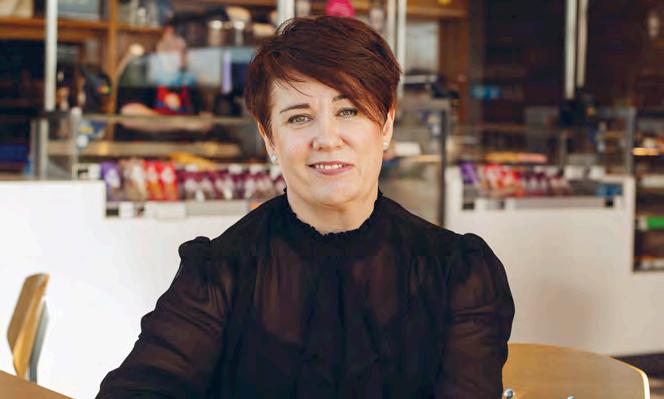
She added: “Our assessment of catchments across the UK continues to support our ambition to have significantly more than 3000 shops.
“Our confidence is underpinned by recent success where Greggs is under represented, such as retail parks, railway stations, airports, roadsides and supermarkets.”
Employment
A contract cleaning and maintenance company aims to nearly double its headcount after £3 million-plus contract successes.
Maxim Facilities Management says it is “on track” to employ about 2000 staff by 2025.
The bullish outlook comes after the Sunderland-headquartered firm secured lucrative deals that pushed annual turnover beyond £13 million for the first time.

Known for working with businesses including Hitachi and Quorn, the operator is also prominent in the social housing sector, having recently renewed a deal with Gentoo.
And Graham Conway, founder and managing director, said such momentum will drive further recruitment, while lifting turnover to £15 million.
He added: “We’re expecting to see our workforce continue to grow through the rest of the year and beyond.”

A blueprint to create a 250-job refinery tipped to add fresh charge to the electric vehicle revolution has been approved.
Green Lithium has been backed to build a factory at Teesport.
Set to annually make up to 50,000 tonnes of battery-grade lithium chemicals, the firm says the site –described as the UK’s first large-scale merchant lithium refinery – will help drive production of more than one million zero-emission vehicles across Europe by 2030.
Bosses say the 58-acre base, which will support more than 1000 jobs during its construction, will also bolster energy storage and national grid stabilisation.
Sean Sargent, Green Lithium chiefexecutive, said: “By 2030, the overall European market alone will require 800,000 tonnes of refined lithium per year.
“And Teesport is an ideal location for producing low-carbon and environmentally-friendly lithium.”
Meanwhile, Teesport operator PD Ports has made a £23 million dredger investment it says “confirms its commitment to the economic success and environmental sustainability of the River Tees”.
The 71-metre Emerald Duchess is due to arrive in the region next summer, with PD Ports saying it will strengthen its ambitions to become the UK’s most sustainable port operator.
A North East-founded international software firm says it is continuing to “build strong momentum” as more customers harness its technology.
Sage Group saw recurring revenue rise 12 per cent to £1.56 billion in the nine months to June 30, with total revenue up ten per cent to £1.6 billion.
Software subscription revenue was up 17 per cent on a year ago to £1.28 billion.
The clamour was reflected across Sage’s principal trading regions, with
the Cobalt Business Park-based operator seeing recurring revenue grow 16 per cent to £702 million in North America, after a strong performance from its Intacct accounting system.
In the UK, Africa and Asia Pacific area, recurring revenue was up 11 per cent to £456 million, with Intacct and the Sage 50 accounting platform leading growth.
The figure was seven per cent better off at £404 million in Europe.
A marketing and communications firm has revealed plans to create 170 North East jobs.
Omnicom Media Group UK is opening a Newcastle office.
Bosses say roles will range from apprenticeships to the post of managing director.
The move comes after fellow Omnicom operator Credera last year announced 200-job plans to provide technology consultancy services from a Newcastle base.

Dan Clays, Omnicom Media Group UK chief executive, said: “The North East, and Newcastle, is an incredibly exciting place to access brilliant talent.
“We look forward to creating career opportunities in the months and years ahead.”
The company will receive £895,000 through the North of Tyne Combined Authority’s Inward Investment Fund to help roll out its plans, with operators including accountancy and business advisory firm RMT and law firm DWF working closely with the group.
Omnicom has also received support from Invest Newcastle.
A contractor has been appointed to create a training base focused on nurturing the house builders of tomorrow.
Sunderland-based Brims Construction will deliver the city’s Housing Innovation and Construction Skills Academy (HICSA).
Officials say the development will provide “next generation skills for next generation homes, supporting advances across manufacturing, carbon reduction and renewable energy.”
Managed by Sunderland College –with support from partners including the George Clarke-led Ministry of Building Innovation and Education – they add HICSA will “educate and upskill local people to create innovative, factory-built new homes”.
Construction of the venture, which will sit within the wider Riverside Sunderland scheme, is expected to begin in September and be completed by 2025.
Jason Wood, Brims director, said: “This is an opportunity to create a lasting legacy for the construction industry.
“We aim to craft a space that will stand as a testament to innovation, quality and purpose.”
Tolent had previously been named lead contractor for the scheme.
An investment firm has bought a fatherand-son architectural practice.
LJC Capital, based in Redcar, has taken on GR Henderson Architectural.
The deal has created LJC Architectural Design, with Sid McAuley, LJC Capital director, hailing its potential.

He said: “Adding these services to the group will allow our property and investment arm to grow.”
Gordon Henderson, who ran GR Henderson Architectural with son Rob, added: “Being part of a bigger group of companies will see the business flourish to its full potential.”
A mutual has hailed its “responsibility to members” in “unpredictable market conditions” after greater support helped push customer numbers and earnings higher.
Newcastle Building Society saw half-year pre-tax profit rise to £16.2 million, with underlying operating profit better off at £15 million.
It says the increases were fuelled by strong customer service, with savings rate lifts complemented by “good value” mortgage offers.
According to its results, rises to savings products in the five months to the end of May equated to £11 million more interest for clients, with changes to its standard variable mortgage rate saving members nearly

A North East law firm boss is leading a national equality drive.
Gill Hunter has been named chair of the British Chambers of Commerce’s Workplace Equity Commission. The managing partner of Newcastle’s Square One Law will work with experts and businesses to set recommendations for the Government and employers around
£336,000 in payments across June. The latter helped the operator attract net core residential lending of £408 million in the half-year to June 30, compared to the £181 million recorded 12 months ago.
Andrew Haigh, chief executive at the mutual – which says it created around 150 jobs in the period, taking its headcount to more than 1630 –said he was proud of its progress. He said: “The fact we have attracted so many new customers demonstrates the value of our approach.”
He added a previously-announced merger with Manchester Building Society was officially confirmed during the results period.
areas including age, disability, race and gender.
A dock operator has secured its largestever oil and gas decommissioning project.
Port of Blyth has welcomed 7000-tonnes of ex-North Sea rigs to its Battleship Wharf terminal.

The apparatus, which includes several platform topsides and jackets, will be demolished by Thompsons of Prudhoe over the coming weeks.
Martin Lawlor, Port of Blyth chief executive, said: “We have established a great track record of successful highprofile decommissioning projects, and are looking forward to supporting further
work across the offshore energy sector.”
Tom Koerner, Thompsons of Prudhoe operations director, added: “This gives us a strong platform to demonstrate our capabilities for all future onshore dismantling and waste disposal requirements.”
A selected round-up of stories from across the region
4A waste-to-aviation fuel firm says it has moved closer to building a “UK first” factory thanks to “transformational milestone” support. Nova Pangaea Technologies has been backed by British Airways operator International Airlines Group. The company, based at Wilton, near Redcar, says the investment will catalyse development of a sustainable fuel production plant, with manufacturing planned for 2025.

4A double-glazing firm has new owners. Washington-based NE&C Windows & Doors is now led by its management team. Founder Ed Ramshaw said: “It is time to pass on the baton to a younger, yet highly experienced, team.” The buyout was supported by Robson Laidler Accountants, JLF Law Firm and Clive Owen Accountants.
A County Durham solar film maker says it has been energised to make further market progress following £1 million support.
Power Roll has been backed by Maven Capital Partners.
The Seaham-based company says the cash will help commercialise production of its solar film – which is used on nonload-bearing rooftops and transport – to a global scale.
Its finance deal included two investments from Maven-managed regional pots, with £750,000 from the North East Development Capital Fund complemented by £250,000 from the
Finance Durham Fund, which is overseen by Business Durham on behalf of Durham County Council.
Neil Spann, Power Roll managing director, said: “Our mission is to revolutionise solar energy by powering a global rooftop revolution from County Durham.
“The need for low-cost clean energy has never been greater, and our solar film has the potential to generate energy from the billions of square metres of rooftops where the heavy and rigid silicon panels manufactured in China cannot be deployed.”
Michael Dickens, Maven investment manager, added: “With green energy more important than ever, Power Roll looks set to drive innovation and produce next generation solar solutions.”
4An independent data collection provider has been taken over. Hexham-headquartered Panelbase has become part of Norway’s Norstat. The deal adds 370,000 panellists to Norstat’s portfolio, bolstering its presence across the UK and Europe. Paul Wealleans has taken on the role of Norstat UK and Ireland managing director.
4Holiday let firm Host & Stay has bought Liverpool’s Host So Simple. The East Cleveland-based operator says the agreement expands its portfolio to more than 900 properties. Host & Stay is part of the wider SDDE Smith Group.
For more news and views across the North East, visit our website @ www.netimesmagazine.co.uk/news
As the Government presses ahead with plans to introduce a further 100 North Sea oil and gas licences, Steven Hugill assesses Downing Street’s climate blueprint and argues the time has come for decisive action to secure the planet’s future.
4When Jonny Bairstow wandered befuddled from Lords’ playing arena during the second Ashes Test match, all scowling eyes and fiery red Wooly Willy-style beard, his lonely walk to the pavilion quickly became a full-on international hike.
With each step, the England batter was surrounded by an ever-swelling throng of explayers, commentators and social media armchair professionals, each and all picking up their sticks for a stroll down sporting integrity lane.
Rishi Sunak grabbed his too, proclaiming, via a spokesperson, naturally, that the touring Australians had contravened the spirit of the game by stumping Bairstow as he left his crease before the end of an over.
They hadn’t; he’d been dismissed in entirely legitimate fashion.
But Tory leaders have made quite the habit of making some – to put it charitably – poor calls over recent years.
And like many of those frothing on social media platforms, the Prime Minister would have been better keeping quiet.
After all, it’s somewhat difficult to take the moral high ground when thrusting 100 new North Sea oil and gas licences upon a world in stark need of more sustainable alternatives.
The move, said the Richmond (North Yorkshire)
MP, was the “right thing to do” as the energy mix continues to transition towards a greener future, pointing out – correctly – that a full-scale conversion to renewable means won’t happen overnight.
But therein lies the point.
Not only does the policy contravene the spirit of sustainability growing across the UK and beyond, but it also creates the feeling of putting a cul-de-sac in place when what was needed were broad avenues that would help expedite progress.
Indeed, it was striking to read a recent report issued by the Government’s Climate Change Committee.
Scalding an administration that has been forcibly “cajoled” into action, and in desperate need of courage “to place climate change once again at the heart of its leadership”, it claimed “the UK has lost its clear global leadership position” on environmental engagement.
Similarly striking was its rebuttal of Sunak’s licence plans, with committee experts arguing that while the UK will “need some oil and gas until it reaches net-zero, (it) does not justify the development of new North Sea fields.”
And then there was the grand unveiling.
Confirmed after the House of Commons had risen for summer recess, it meant policy was batted back and forth through newspaper
articles, television interviews and social media posts, the customary opportunity of adding further scrutiny to Government proposals from the despatch box taken away.
And for a Government that has endured – to borrow another cricketing reference – a procession of ministerial ins and outs akin to English batters’ permanency during 1990s Ashes shellackings, it hardly made for a good PR campaign, either.
Less than a year from the next General Election, and with voters sharpening their focus on where to place their crosses, “maxing out” North Sea reserves – as one junior minister phrased it – while Europe sweltered and a large chunk of Britain’s summer was left saturated, hardly came across as an obvious vote winner.
It’s a shame the Prime Minister wasn’t at the first day of the Lord’s Test, before the whole spirit of the game story blew up.
Because if he had been, he’d have seen, ironically enough, Bairstow walking from the field again, this time not with a bat under his arm, but a Just Stop Oil protestor, who’d tried to throw the group’s now customary orange powder over the pitch.
The Yorkshireman – who defied security orders to confront trespassers – acted instinctively to deposit the campaigner beyond the boundary edge and restart the game, attracting great applause from the gathered crowd.
But, for many, the somewhat comical interlude acted too as a reflection of where the Government’s commitment lies around the environmental agenda; it knows it’s there, but it is equally happy for it to be moved aside for other acts to play out.

And with the climate wicket getting increasingly stickier, we need those in power - whether it be this Government or the next, depending on the forthcoming national ballot - to truly grab the initiative and take firmer action.
Because if they don’t, then generations to come will be left, like Bairstow, comprehensively stumped.
In a world of huge sustainability shifts, so too are our appetites changing.
Where once the vast majority of us satisfied hunger with no excessive thought to a product’s provenance, today every link in the food chain is ever-more scrutinised.
And with good reason.
According to a campaign launched by The Vegan Society, 2.1 million cattle, pigs and sheep are slaughtered every month for human consumption across the UK.
The numbers provide an alarming snapshot into the food industry’s reliance on animals, and serve to highlight, with no little anxiety, the need for watershed change around production.
Steps are already being taken, with plant and animal cell-based foodstuffs, for example, much more de rigueur on shopping lists and dinner tables than ever before.
But it’s only the start, and much more must be done.
Words by Kris Wadrop Managing director of food, agritech and materials at CPI
With increasing numbers of sustainability goals reworking what we consume, the novel food market is booming. Companies across the globe are seeking ever more to make and launch pioneering alternative proteins that could change the way we eat. Here, Kris Wadrop, managing director of food, agritech and materials at Wilton-headquartered innovation support organisation CPI, which operates further bases across the region, reveals how its work is helping the North East lead the way.
4A revolution is taking place within the food industry.
Recent years have seen a surge in demand for novel foods, with alternative proteins, such as plant-based items, and those from fermentation processes, including cultivated meat, making up much of this new market.
More people than ever are changing their eating habits, motivated by a drive towards a sustainable and greener society, with alternative protein-based food markets in Europe and the UK projected to grow to £6.8 billion by 2025.
However, businesses looking to exploit this growth can face significant challenges.
Firstly, they must prove products are safe.
Secondly, products must pass ‘taste and texture’ tests, because nobody wants to sit through a bad meal, whether you’re ecoconscious or not.
We’re proud to have passed the allimportant safety test, having recently achieved FSSC 22000 certification, which is a globally-recognised gold standard for food safety.
It’s a landmark achievement, and one that shows the science behind alternative proteins can keep pace with changing demands.
At our base in Redcar, we’re using a process called precision fermentation
to create healthy alternative proteins, which look and taste like meat-derived counterparts.
Similar to the process of brewing beer, the base ingredients we’re producing can then be used to develop novel products.

It is innovative technology, which has enormous potential to produce new foods faster and on a smaller land footprint.
But, for the region, it can be so much more.
We want these latest advances to transform the North East into the epicentre of a UK food revolution.
Operating at the forefront of this rapidly expanding industry, we can attract more businesses to a region famed for its innovation and help regenerate local communities.
It’s a bold vision, but we have a simple plan to get there.
We don’t want to own advancements like precision fermentation, we want to share them.
Our goal is to open our facilities and invite companies to use our technology to develop new products.
In meeting global challenges, we can’t lose sight of how we can empower local communities to go on that journey with us.
Our future food project can act as a step-change in the food industry, as well as a catalyst for business and communities too.
Throughout the many spins and colour runs of the UK’s electoral cycle, skills provision – specifically its reform –has seemingly been on a constant rinse and repeat programme.
And the button has been pressed again, this time by the Industrial Communities Alliance, which calls for change to the apprenticeship system.
In a report released over the summer, the body – an all-party association of local authorities in industrial areas across England, Scotland and Wales – makes six major recommendations, which it says would put vocational learning “on an equal
footing with academic qualifications”.
Its blueprint includes the creation of a national partnership between employers, unions and the Government to improve skills policy, and a remodelling of the Apprenticeship Levy to allow larger companies greater spending flexibility.
Elsewhere, the organisation –whose study argues “the era of more and more graduates is over” – calls for skills funding to be devolved, initially to combined authorities, and the founding of an expert body to advise on skills investment.
years won’t be easy, though simplifying the levy system would come as a relief to many.
The report talks about remodelling the Apprenticeship Levy – paid by larger employers – as a skills duty to allow flexibility on how funds are spent.
My view is that employers need more flexibility on levy spending; so as long as money is spent on a named apprentice, it should be covered.
Currently, only things within apprenticeship standards are included, but that only provides a minimum.
When I employed level five maintenance apprentices, I spent between £10,000 and £15,000 per candidate on additional training, to get them to the level required.
Every region deserves an equal voice, but devolving further education and skills funding in England to combined authorities, as advocated in the Industrial Communities Alliance study, could be a double-edged sword.
Words by Professor Ian Green Co-chair at the North East Apprenticeship Ambassador Network
As a new report by the Industrial Communities Alliance calls for watershed reform to the vocational learning framework, Professor Ian Green, co-chair at the North East Apprenticeship Ambassador Network, assesses the existing skills landscape, analysing progress made, the potential impact of the region’s devolution deal and, conversely, the danger of too much change.
4Apprenticeships have come a long way.
Some may still hold the misconception they are the ‘easy option’, or for youngsters ‘not academically minded’.
But that isn’t the case.
Businesses across all sectors have woken up to the potential of apprenticeships, and now provide high-quality training in everything from engineering to law, from machinists to accountants – the list is endless.
But it’s fair to say that while popularity
boomed around a decade ago, it has slowed recently, with alarm bells set ringing after research showed a fall in the number of young people choosing apprenticeships.
Reform is required.
The Industrial Communities Alliance report argues apprenticeships should be put on an equal footing with academic qualifications – and I agree.
However, reforming a system that underwent significant change in recent
Manchester and London are huge mayoral authorities, with focused spending.
And when the North East mayor is appointed within the next year, it could help put us on a level footing.
But, equally, it may not, because devolving budgets could mean the North East may lose out, based on employer sizes and contributions to the levy.
Yet there are plus points.
The idea of a national partnership to unite employers, unions and the Government, to provide oversight on skills policy, is welcome.
In fact, the framework already exists, thanks to the work we do via the Apprenticeship Ambassador Network.
The current system has its flaws – it has failed, for example, to engage smaller businesses in the apprenticeship agenda.
But we must avoid throwing the baby out with the bathwater.
Doing that would mean losing the progress we have made around creating such a huge and varied mix of apprenticeship opportunities.


your
In a world of continuing financial uncertainty, having access to assured support is crucial. And one firm providing such is wealth manager Raymond James. Having recently expanded into the area with a new office, Raymond James, Monument is guiding clients on investment and financial planning decisions across the North East and beyond. Here, Steven Hugill speaks to branch principal Gary Fawcett and wealth managers Rob Brotherton and James Carrick about the value of its expertise in ever-changing times, its tailored approach to clients’ needs and its plans for expansion.
www.monument.raymondjames.uk.com
LinkedIn: Raymond James Monument
Gary Fawcett pauses mid-sentence, a large thud from the floor above momentarily stopping his flow.
Not that Gary, reclining in a plush velvet chair in Newcastle’s Portland House, minds too much.
On the contrary, such sounds – from builders revamping the ex-Newcastle Building Society headquarters into a business hub – provide a more than suitable bed for wealth management firm Raymond James’ own mood music.
While Portland House, and the skyward-shooting steelwork of the neighbouring Bank House and Pilgrim’s Quarter schemes point to a city undergoing significant commercial conversion, equally does
Raymond James’ additional North East office tell of industry revision.
Having moved into the New Bridge Street Westbased cohabitation space earlier this year, the firm’s branch – known as Raymond James, Monument – is busily reshaping the investment and financial planning environment.
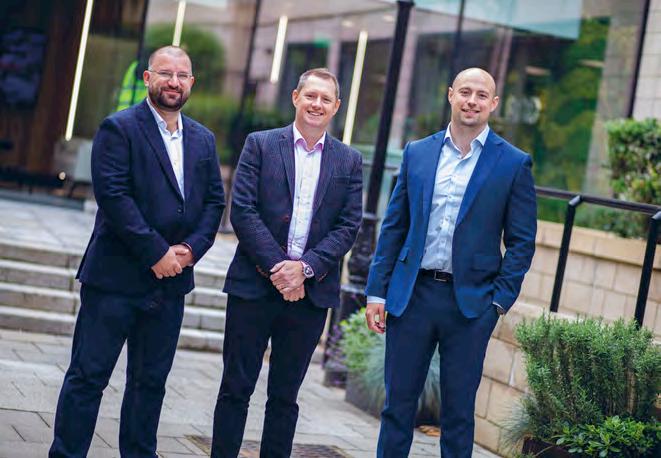
Central to such is its deeply personalised approach, which complements the unique needs and circumstances of individuals and families, business owners, trusts and charities across the North East, the Scottish Borders, North Yorkshire, the Lake District and beyond.
Gary says: “In a world of consolidation, it feels like the personal touch is being lost.
“But the client is at the heart of everything we do, and our truly tailored financial advice and investment management support is also delivered at a price point we feel offers value for money in our sector.”
Equally fundamental, says Gary, is the individuality the branch’s team – which collectively possesses more than 50 years’ industry experience – can impart on every client decision.
Gary says: “We aren’t tied to products or beholden to fund houses.
“Chartered wealth manager James Carrick and I, for example, build tailored portfolios to meet individual client needs, using an array of research we have access to through Raymond James.
“We act upon what we see, and develop our investment strategy for clients accordingly.”
Gary, who has more than two decades’ experience in the region’s wealth management sphere, adds: “We
go far beyond a transactional service.
“A lot of people presently feel disconnected with their money, that their funds are being managed by someone they don’t know.
“But we do things differently.
“We feel ours is a much more intimate offer; when clients work with us, they know they are dealing with the people making the investment decisions, and that gives them greater confidence.
“And it hopefully means we retain clients while gaining the next generation.
“Our support spreads into the wider community too; we’re very good at connecting people and businesses, we’ve married firms with angel investors and we’ve had coffees with students wanting to get into the industry.”
“We’re always very happy to share time to help others,” says Gary, who reveals the Monument team aim to donate a percentage of their turnover to charity as they grow and become profitable.
Citing the branch’s support of business owners, Rob, a Chartered financial planner and wealth manager, adds: “Many are so focused on their ventures, they sometimes don’t focus enough on their own finances.

“We support clients for the long-term, with plans that are constantly reviewed – they are never just a number to us.
“We guide them through changes to personal situations, as well as legislation and factors like inflation and interest rates, which ensures they’re looking at areas like pension contributions and ISAs, and making use of annual allowances.”
“It all helps structure plans that provide the best options for their futures,” adds the Northumbria University graduate.
And such provision is primed to be amplified in the coming months, with growth aspirations for the team over the near-term.
However, while faces may change, the ethos of the branch – which recently joined industry-led tech organisation Dynamo North East – will remain proudly constant.
James says: “There is a buzz about the North East, and we’re joining a very exciting journey.
“But while we’re looking to the future, we’ll never lose sight of the branch’s heart – the client.”
“And that will be distilled into everyone who joins us,” says James, who has previously guest lectured
to Northumbria University finance and investment management degree students.
He adds: “We want to build the best possible team, and are passionate about recruiting from all walks of life.
“We want to attract more female advisors to the industry, build a wider, more diverse team full of equally diverse ideas, and prove a career in wealth management doesn’t mean a career in London.”
Gary adds: “This practice will grow by doing the right thing.
“Our biggest passion is helping clients achieve their financial objectives.
“When they do that, it means we’ve done a good job – and we’re fully committed to increasing our support to help more reach their goals.”
Northumbrian Water
For more information about Northumbrian Water, and the provider’s wider work across the region, visit its website and social media channels, which include Facebook, Instagram and X.
The water industry is set for huge change over the next few years, including a big increase in infrastructure spending. Here, Monisha Gower, Northumbrian Water’s assets director, explains what it means for the North East, both for customers and businesses in the company’s supply chain.
www.nwl.co.uk/ @nwater_care
We don’t often think about how water gets to our taps, and we certainly don’t think about how it’s going to get there a few decades from now.
But, for Monisha Gower, Northumbrian Water’s assets director, it’s a full-time job.
“Investment in the water industry works in five-year periods,” says Monisha.
“And we’re right in the middle of one.
“But I’m already thinking about how we can reach the end of the next one, having delivered everything we need to.”
To provide a sense of scale, at the start of 2023, Northumbrian Water began a huge, £155 million project to upgrade and future proof the water supply network in
the south of County Durham and across the Tees Valley.
The scheme, called Project Pipeline: County Durham and Tees Valley, will benefit 200,000 people and see the replacement of existing infrastructure, as well as the construction of a new 24-kilometre pipeline between the company’s Lartington Water Treatment Works and Shildon.
That’s the kind of project being delivered now, but under the next investment period – known in the industry as an asset management plan period, and running from 2025-2030 – Northumbrian Water’s spending is expected to more than double.

It's an unprecedented level of investment for the industry as it drives up environmental standards and builds a more resilient network for the future.
That’s good news for a region full of Northumbrian Water customers, but that kind of step up in activity can put pressure on supply chains, especially as it comes amid similarly busy periods in the national infrastructure plans for road, rail and other utilities.
Luckily, that’s something Northumbrian Water has been conscious of, and preparing for.
“We’ve made a huge effort to build deeper relationships with our partners in our supply chain over the past few years,” says Monisha, “putting in place a responsible procurement strategy and a supplier charter, and making clear what we expect from partners in terms of ethical practices, job creation and re-investment in the region.”
Northumbrian Water holds up its end of the bargain too, with a commitment to spending 60p in the pound in its local economies.
The company spent a total of £380 million with its
suppliers last year.
Its investment is then amplified by the suppliers themselves, with £121 million of that total re-spent with other businesses in the local economy.
Overall, it supported suppliers to create nearly 1600 new jobs last year, and 182 apprenticeships across the region.
“We recognise that as one of the biggest businesses in the North East, we have a responsibility to do what we can to improve our local communities,” says Monisha.

“That starts with our spending power, but also involves using our influence and expertise to help our partners have a positive impact too.”
It’s an approach that’s proving fruitful; as well as the jobs and apprenticeships created, Northumbrian Water’s suppliers have contributed more than 10,000 volunteering hours to local causes.
That mirrors Northumbrian Water’s internal scheme, which in 2022 saw 38 per cent of people take advantage of an initiative to use paid time for volunteering, working with more than 300 organisations in their local areas.
“This kind of activity has become embedded in what we do, and in our relationships with partners,” says Monisha.
“As a business, alongside our people's volunteering, we re-invest one per cent of our profits into community activities, working on educational programmes, Christmas appeals, citizen science projects – a whole variety of things.”
A recent development with suppliers has been the formalising of their involvement in similar activities, with a real focus on delivering true social value.
In the case of the Project Pipeline works across County Durham and the Tees Valley, lead contractor Farrans worked with Northumbrian Water to agree a social value delivery plan before the project began.

“They’ve already delivered a wide range of activity towards that,” says Monisha, “attending a careers fair, creating a work experience placement, working with
local employment support initiatives to fill vacancies, and engaging with stakeholders like local schools and colleges, Jobcentre Plus and Durham Community Action.
“It all aims to really ground them in local communities.”
The challenge now for Monisha and her team is to scale up the model Northumbrian Water has developed and put it into place with Farrans and their other suppliers, so it can be used across the next, expanded five-year plan.
Monisha says: “For us, the next 18 months or so, to the start of our 2025-2030 period, is all about capacitybuilding.
“Firstly, that will be capacity in our own team, to make sure we can deliver high-quality projects, but –importantly – capacity among our potential partners too.”
She adds: “It’s absolutely a challenge, but it’s filled with opportunity too.
“The opportunity to invest more and create greater value in the North East.
“The opportunity to build new collaborations, which will let us better serve our customers.
“And the opportunity to innovate and help the region move towards net-zero while improving its water environments.”
And, as the countdown continues to the next International Week of Happiness
late September, companies are again being
MAX FREER Founder OOK Agency
We know low wellbeing results in higher levels of absence; indeed, a recent study shows mental ill-health and stress to be the top two causes of long-term absence in UK workplaces.
It’s also one of the reasons employees quit their jobs.
JO DAVIES Managing director HR Alchemy

On the flip side, though, is the positive, mounting evidence that demonstrates investment in wellbeing is achieving results.
Co-founders,
Alchemy CulturePositive work culture is more than perks and Google-looking offices, and keeping employees happy requires more than just a pay slip.
People today crave a deeper sense of connection to their work, the place they live and the brands they choose.
They expect more of employers than ever before, and want businesses to demonstrate a greater integrity, accountability and care.
It is essential businesses understand this and how, in a landscape of cross-generational workforces, that company culture is a critical framework for teams to operate in harmony.
The ever-growing research into wellbeing and company performance shows it has a significant impact on numerous areas of business performance.
And through OOK Agency, HR Alchemy and our workshop programme Alchemy Culture, we are helping clients create more authentic ways of managing their employee brand proposition and thus wellbeing.
We help companies take meaningful steps, by moving their values, ethos and overall culture towards investing in their people.
JAMES BUNTING Chief executive LeightonWe focus on ‘work-life fit’, which is the concept of a colleague’s work and life needing to fit together, rather than the more traditional view of a work/life balance.
To me, work/life balance suggests some sort
The importance of finding a balance between working patterns and personal life has never been in sharper focus.
at Work in
urged to take meaningful steps to support staff. Against that backdrop, what are the key measures you believe businesses should be concentrating on to ensure workforce wellbeing and happiness?
of circus act, whereas ‘work-life fit’ is focused on making the two aspects fit together perfectly.
Providing flexibility is essential.
Empowering your team to choose when, where and how they work can significantly contribute to their overall wellbeing, and it also means they can make the right choices for them and their own personal circumstances.
Nurturing a sense of purpose is crucial too.
When colleagues understand how their contributions make a difference and are continuously encouraged to set and achieve stretch goals, they are more engaged in their work, and the journey towards achieving these goals becomes a source of fulfilment and satisfaction.
Finally, recognising the importance of social connections is vital.
Businesses should encourage regular opportunities for colleagues to come together and connect.
Whether through team building activities, social events or collaborative projects, fostering a supportive and connected work community positively influences wellbeing and happiness.
their own.
For this to be successful, though, businesses must provide employees with targets that will have a real impact on the organisation while developing the individual’s skillset.
Ultimately, the flexibility of being able to pick the kids up from school or playing at your local sports club can all be achieved.
But at the core of a work/life balance is a happy workplace, which involves having a great amount of responsibility and trust between employees and employers.

What people want from a workplace has changed since the pandemic.
People are prepared to give their all for a fasttracked career, but on the condition they can work on their own terms and are compensated fairly for it.

The health and wellbeing of the workforce has never been more prevalent, and it includes an effective application of a balanced environment, including hybrid or working from home.
The key to making this a success is an open and transparent dialogue between employer and employees, to ensure staff can benefit from flexible working and the business can still operate efficiently. We have recognised none of the above can be fulfilled without implementing a culture of trust within the workforce.
Best-selling author and workplace culture expert Simon Sinek has proven employees are happier at work when they have autonomy to make decisions on
They will no longer stick around for the promise of salary increases or promotions that never happen, because they now want more than that in return: they want a healthy work/life balance.
At durhamlane, we’ve been taking measures to support this by providing fast-tracked sales and marketing careers, helping employees gain skills they can use anywhere in the world at any time, with full trust to do the role when and how it suits them.
We also offer fully remote or hybrid contracts, with limited expectation on office attendance.
And we allow life to happen when it needs to, by accommodating those who need compassionate time away from work.
We measure success by reviewing employee satisfaction data, such as our overall Employee Net Promoter Score.
By offering formalised flexibility, a competitive salary to support a stable and healthy lifestyle, and strong leadership, we’ve seen how you can gain loyalty and increased retention from your workforce.

We have embraced a new way of thinking about regional print and its evolution for the next generation. We are firmly committed to being the voice of the region’s business community and championing our area’s industry, creativity and innovation.




www.novocastrian.co lindalmond.co
instagram: novocastrianco lind_almond
Words
Sometimes, our paths are simply destined for us. Born into a long line of metalworkers, whose hands helped craft ships for the world, Richy Almond’s certainly was. He began young, working for pocket money during school holidays at the family fabrication business.
And when Britain was squeezed by financial recession, Richy, who grew up near Newcastle, twined the two together. Although enjoying his time as an architect in London’s luxury interiors industry, Richy yearned for the days of steel crafting yore, and – while designing unique metalwork for a Swiss villa – realised he could fuse his passions into a single entity. The result was Novocastrian.
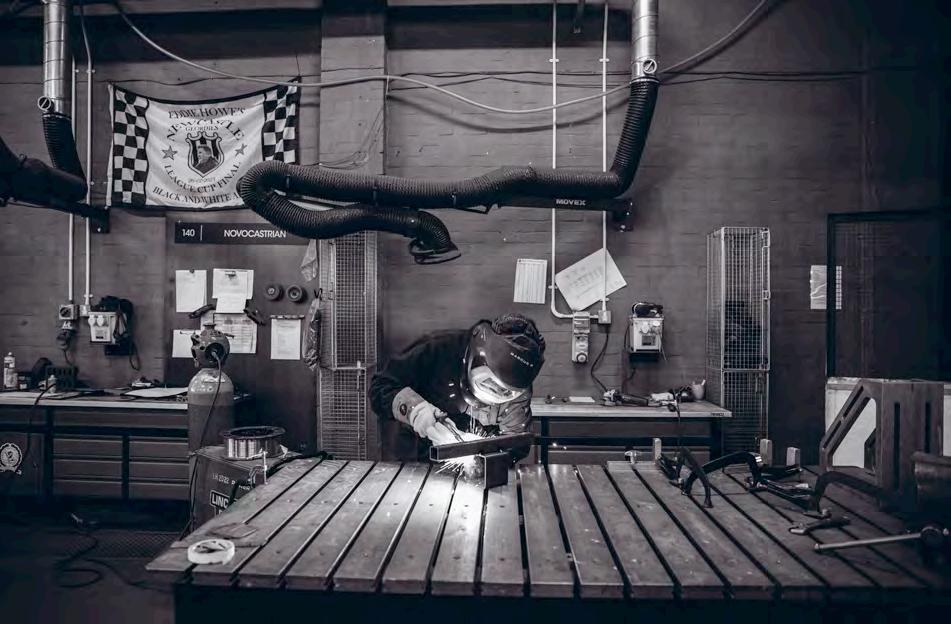
And as he grew, so too did his passion for steel. His enthusiasm remained undimmed even as he switched to study his other great love – architecture – at Northumbria University, Glasgow School of Art and University of Westminster in the 2000s.
Describe your craft
My interest is in design in a holistic sense, in how the great architects crafted entire ways of living, designing every detail of buildings, as well as the fittings and furnishings.
Metal is, and will always be, our go-to material.
Steel, in particular, feels as though it runs in our blood, and we are continually exploring ways to elevate such a humble, versatile material into something special.
Where – and how – do you seek inspiration?
Our region's industrial heritage is a fail-safe source of inspiration, from the rhythmic functionality of the railways to the surprisingly-ornate detailing of Victorian ironwork and the beautifully-curved hydrodynamic shapes of a ship's hull.

How important is failure in the creative process?
I think it was Voltaire who said, “don't let the perfect be the enemy of the good”, and I regularly repeat it to myself when I become hesitant.
In the creative industries, there's a particular problem with ego, and I believe failure plays a vital role in keeping that ego in check.
“Don't let the perfect be the enemy of the good”
Repurposing the tradition, craft and skills of his hometown to match the opulent desires of the furnishings market, the venture gained instant traction. And its momentum has yet to slow.


“ Find something that inspires you, however unusual, then jump into it ”
The Washington-based business has grown to become a distinguished name across the UK and beyond for its suite of handcrafted items, such as dining tables, mirrors, screens and lighting, which are all fashioned from metalwork, and all continue to carry a torch for the endeavours of Richy’s forefathers.

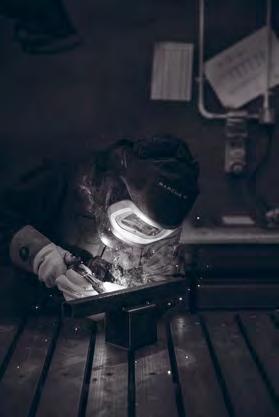
What advice would you give to someone pursuing a creative role? Find something that inspires you, however unusual, then jump into it.
Experiment, and make as many mistakes as you can.
Cherish all advice that you're offered from those who are ahead of you.
Are you still stoking your architectural passions?
Yes. I remain a practising architect, designing boutique hospitality projects as one half of award-winning duo Lind + Almond.
LycettsOne of the UK’s leading independentlyoperated insurance brokers, Lycetts provides bespoke financial services and commercial, private client, farm and estate, and bloodstock insurance advice. For more information, call its Newcastle head office on 0191 232 1151 or email info@ lycetts.co.uk
Insurance broker and independent financial adviser Lycetts has opened a new head office in Newcastle’s Bank House. North East Times Magazine attended a ceremony to celebrate its move, during which head of management services Charles Renwick told editor Steven Hugill more about the space and the scope it provides to catalyse future growth.
www.lycetts.co.uk
LinkedIn: Lycetts
Insurance broker and independent financial adviser Lycetts aims to double in size after making a “statement of intent” office move.
The firm is working towards a five-year growth plan after switching its UK headquarters to Newcastle’s Bank House.
It hopes to bolster its 100-plus North East team and “do more business in the region” from its flagship commercial base.
The company has taken a 15-year lease on an entire floor in Bank House, ending six decades at Newcastle’s Milburn House.
Its relocation was marked by a champagne reception, with guests hearing from Mark Hews, group chief executive at Lycetts’ parent organisation Benefact Group; William Nicholl, Lycetts’ client director; and Charles Renwick, Lycetts’ head of management services.



Speaking to North East Times Magazine, Charles said Bank House provides Lycetts – which oversees 16 offices across England and Scotland from its Newcastle headquarters – with much room to expand.
He said: “We are very proud of our North East roots, and equally proud to operate nationwide from this area.
“Our new office is a balanced statement of intent, both in terms of our commitment to the region and our commitment to doing business in the region.
“Mark Hews has backed us in coming here, and has set us the challenge of doubling the size of our business
Pictured, from far left, clockwise, are Lycetts' Emily Young with Colin and Kim Peacock
Neil McGuire, of Lycetts, with John Ellis, Mark Bryce, Tania Love, Charlie Hoult and Mark Squires
North East Times Magazine director John Duns, left, with Charlie Bennett and Mark Squires
Dr Kate Hoult and Alistair Scott
John Murphy, Lycetts' associate director, right, with John Trevelyan and Samantha Orde
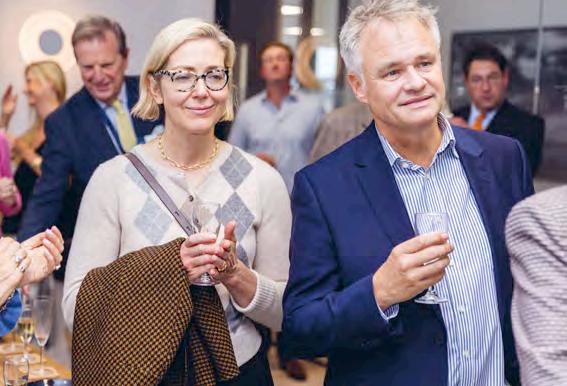
William Nicholl, Lycetts' client director, left, with Charles Renwick, the firm's head of management services

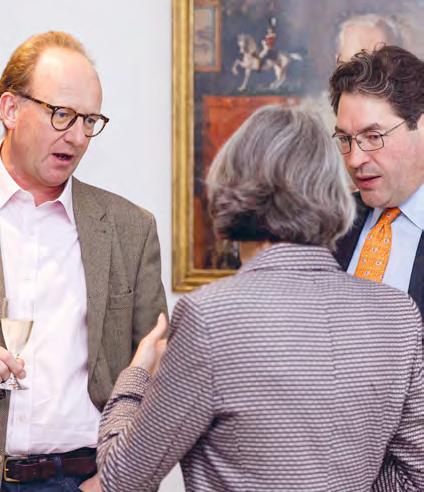
Michelle Bell and Jon Gordon
in five years.
“It’s now down to us to make the most of it.
“We work with a lot of clients around the UK, and that will continue.

“But the new office provides an opportunity to do more business in the North East too.
“We’ve got scope to grow quite considerably.”
And, said Charles, the move has been very well received by staff.
He added: “The impact of the new office, for me, was summed up by a conversation I had with a member of the team.
“She used to work from home twice a week, as part of our hybrid offer, but she now wants to work in Bank House all of the time.
“The office environment helps people develop relationships and learn, particularly younger members of the team.
“And Bank House provides us with great space for them to do just that.”
The headquarters switch followed Lycetts’ announcement of record financial results.
Annual turnover rose £2 million to £25.5 million, with pre-tax profit increasing 11 per cent year-on-year to £3 million.
The Endeavour PartnershipAs the largest independent commercial law firm in the Tees Valley, The Endeavour Partnership is experienced in all aspects of business law. Recognised for its specialist departments and multiple layers of expertise, the firm offers commercial legal solutions that go beyond static advice, and is committed to producing innovative options for clients while demonstrating business-focused thinking.
Fresh from a record deals year, The Endeavour Partnership’s corporate and commercial team is continuing to move ahead at great pace. Here, Steven Hugill speaks to team lead Nik Tunley and fellow partners Nigel Williams, Martin McKinnell, James Butler and Jessica Lenham about its successes, plans for future growth and unrelenting commitment to the highest levels of customer service.
www.endeavour.law
@Endeavour_law
Leaf through any business playbook and it doesn’t take long to arrive at the chapter devoted to strong customer service.
Words on a page, though, are one thing.
Successfully transferring them to the commercial world, where a client’s needs flex against market flux, is quite the other.
Many struggle. Others fail.
But not The Endeavour Partnership.
Tees Valley’s largest independent commercial law firm more than embodies the literature.
And it has the statistics to match.
Take the Stockton-based firm’s corporate and commercial team, which advises on areas such as mergers and acquisitions, start-ups, management buyouts and shareholder agreements, as well as a range of other commercial undertakings.

The team enjoyed a record deals year in the period to July 31, with 63 completed transactions and more than 30 instructed deals in the coming months.
And the cornerstone of it all, says Nik Tunley, partner
and head of the 14-strong team – whose clients include agricultural, engineering and technology sector operators – is an unremitting focus on customer support.
He says: “Things evolve over time, but our service levels will never change.
“They are the backbone of what we do.”
Integral to its delivery is a deeply personal approach, which transcends static legal advice.
Partner Nigel Williams says: “Clients will often ask, ‘what would you do?’.
“Owner managers sometimes just want a little bit of guidance, rather than a list of options and consequences.”
“And because we’ve worked with a number of clients for so long,” adds Nik, “it means we’re able to say, ‘you’ve done this before, and I was with you on those journeys, so look at what happened then and let’s apply it here’.
“We’re not making decisions for clients, we’re using our knowledge of what suits them to present facts and outcomes from previous engagements to help shape future moves.”
And, says partner James Butler, the commitment separates The Endeavour Partnership from market contemporaries.
He says: “We provide pragmatic commercial advice, which obviously makes a big difference.
“For some clients, it means we act as their in-house lawyer, looking at issues and providing solutions and advice from a position of already knowing what they want and need.”
“We are also unusual”, adds Nigel, “in that all our work has a partner-led focus.”
He says: “Clients want to know the person in charge has a real handle on things; they want to speak with a partner who is across the detail.”
Fellow partner Martin McKinnell says: “When a client
works with us, it is never the case they will see a partner on the first day, and then never see them again.”
James adds: “A lot of work goes into every transaction, and a client can call the lead partner and have a straight conversation on every element.”

Such is the impact of its service, the corporate and commercial team’s reach continues to grow.
Where once its core client base sat predominantly within a 50-mile radius of The Endeavour Partnership’s Teesside headquarters, today the circle has widened to the US and European countries including Germany, Sweden and Switzerland.
It also recently acted for a Milan operator on a Midlands acquisition, with the work secured through links to a London accountant aware of Nik from a previous transaction.
Nik says: “Not only did it highlight our connections, but it showed too how we are more than capable of competing against national and international law firms.”
Martin adds: “That an accountant, who knows many people and organisations across the City and beyond, recommended us is a great reflection of our product and service delivery.
“Our ability to deliver deals up to £50 million is unrivalled on Teesside.”
As such deals continue to help the team’s standing grow, so too, says Nigel, will its headcount, with arrivals

Pictured, far left, from left to right, are Martin McKinnell, James Butler and Jessica Lenham, partners in The Endeavour Partnership's corporate and commercial team
Pictured, left, Nigel Williams, partner in The Endeavour Partnership's corporate and commercial team
Pictured, below, Nik Tunley, partner and team lead in The Endeavour Partnership's corporate and commercial team
set to join a roster that has doubled in the last five years and includes recently appointed partner Jessica Lenham.
Having arrived at the firm in 2014, Northumbria University alumni Jessica is also a graduate of The Endeavour Partnership’s training framework – and the customer focus and real-world experiences they instil –which she says are integral to its enduring successes.
She says: “I was given so much responsibility and hands-on opportunities as a trainee, and that really helped my progress.
“It’s such an open atmosphere, and I know I’m always supported when doing the best for clients.”
Alongside such physical expansion will be a continued broadening of the corporate and commercial team’s strategic partner network, which, says Nigel, will further augment client relationships while catalysing The Endeavour Partnership’s wider market station.
He says: “We get a lot of referrals, from accountants, bankers and other law firms.
“Some of the latter cover specialisms such as wills, trusts, family law and personal injury – where we don’t –and we, in turn, provide guidance to those firms’ clients around areas where we do specialise.

To learn more about The Endeavour Partnership's corporate and commercial team, which includes sixth partner Deborah Kirtley, who specialises in banking and finance work, contact 01642 610300.
North East Times Magazine met members of The Endeavour Partnership’s corporate and commercial team at the new headquarters of the firm’s client Mandale Group, in Urlay Nook, near Eaglescliffe. For more information about the property development company, email info@mandale. com or call 01642 605514.
“Market dynamics will always change, but we’ve built a system that leaves us in good shape to continue moving forward.”
Nik adds: “We get deals done.
“It is what we are known for, and we make sure clients are properly looked after throughout the process.”
As specialist recruitment and outsourced talent services partner Jackson Hogg continues to strengthen links between companies and the temporary labour market through JH Industrial, Steven Hugill assesses the venture’s market-leading qualities and its commitment to delivering service with a personal touch.

www.jacksonhogg.com
@JacksonHoggRec
A conduit between companies and the temporary labour market, JH Industrial helps businesses find staff, from production and warehouse operators to CNC, welders, fabricators and myriad roles between.
Central to its provision is a team of talent, compliance and payroll experts, led by Matthew Robertson, associate director: operations and engineering, and Jake Richardson, head of operations and supply chain.
A key part of Jackson Hogg’s trusted network, JH Industrial colleagues ensure clients – many of whom work across STEM-based sectors such as manufacturing, engineering, offshore energy and food production – not only receive the highest standards of service and access to the best candidates, but are plugged into changing market patterns to plan for the longer term.
In a rapidly-evolving technological world, where artificial intelligence and post-pandemic cultural shifts continue to unpick traditional strands of human connection, Jackson Hogg remains dedicated to the personal touch.
With its specialist teams regularly meeting clients face-to-face, the business cultivates deep relationships that fashion comprehensive understanding of employers’ needs against continuously shifting market trends.
-
To find out more about JH Industrial and how your business could benefit from Jackson Hogg’s wider suite of specialist recruitment and outsourced talent services support, visit www.jacksonhogg. com/for-clients/ industrial/, call Matthew Robertson, on 07498 710631, or email matthew. robertson@ jacksonhogg.com
This approach allows Jackson Hogg to react to employers’ requirements in real-time, with JH Industrial colleagues, for example, working daily across the marketplace to pool talent in readiness of firms’ expeditious needs around areas such as sickness cover.
Providing a consistent approach for clients, it also introduces organisations to Jackson Hogg’s wider portfolio that includes executive search, recruitment, Talent Partnership and HR support.
A supportive partner Care, and a devotion to giving back to the communities within which it operates, are fundamental to Jackson Hogg.
And its empathetic approach permeates through JH Industrial, with its expert team meeting candidates in person, tailoring guidance against their ambitions and skillsets, and providing CV writing support
and interview techniques to bolster workplace opportunities.
Furthermore, if a candidate is unsuccessful in applying for a role, the team is on hand to provide additional one-to-one supervision to help individuals prepare for their next opening.
Equally fundamental to JH Industrial’s delivery of care is its Gangmasters and Labour Abuse Authority licence.
One of only a small number of firms to hold the Government-mandated qualification in the region, it certifies Jackson Hogg as a recognised protector of workers’ rights across the food and packaging industries.
Safeguarding people from risk of exploitation, the licence ensures companies operate legally and ethically, and treat staff equitably and with respect.
And it means any firm enlisting Jackson Hogg’s services does so in the knowledge it is approved to provide the entire food and packaging supply chain with workers who will remain safe and receive fair pay.
Complementing headquarters in Wallsend’s Cobalt Business Exchange with a base on Billingham’s Belasis Business Park, Jackson Hogg’s reach spans the entire North East.
And, thanks to such spread, clients from Teesside’s engineering and chemical processing sectors, to Sedgefield’s NETPark technology hub, Wearside’s manufacturing network, Newcastle’s ever-growing life sciences ecosystem and everywhere in between, benefit from a deeply knowledgeable approach that moulds specific responses to their unique recruitment needs.
And nowhere is the impact of such geographical breadth more pertinently emphasised than through JH Industrial.
With Wallsend-based Matthew, Jake and temporary operations and supply chain senior consultant Jaymie Barry augmented by Teesside-based industrial team leader Mathew Johnson and industrial consultant James Dexter, as well as contract and finance coordinator Suzanne Lowes, the venture delivers on-theground services that are attuned to variable sector and inter-regional demand.
And with the team planned to expand over the coming 12 months, in line with Jackson Hogg’s wider growth strategy, JH Industrial’s scope is primed to

extend yet further.
With disciplined experts operating across the entire recruitment spectrum, Jackson Hogg is perfectly placed to support your workforce expansion plans.
From sourcing skilled and unskilled temporary labour through JH Industrial to matching firms with directors, non-executives and C-level leaders via its executive search offer, the business understands the employment landscape intricately, with an everincreasing portfolio of clients taking the next steps on their respective growth journeys thanks to its guidance.
If you believe your business would benefit from its support, contact the company to learn more about a free, no obligation audit of your recruitment processes.
British Business Bank is launching a £660 million investment package to support small and medium-sized organisations across the North of England. Entrepreneurs and innovators are being encouraged to apply for cash from the Northern Powerhouse Investment Fund II when it launches next year, one of six new Nations and Regions Investment Funds which aims to deliver £1.6 billion of new support to drive sustainable economic growth across the UK. And it will all be spearheaded by Newcastleborn Louis Taylor, who, as Colin Young discovers, has his heart set on adding extra value to his beloved North East through the Government’s small business bank.
Words by Colin Young Photography by Christopher Owens

4Louis Taylor hasn’t lived in the North East since he left to study law at Cambridge University more than 25 years ago.
The region, though, remains a fundamental part of his DNA.
For while the softly spoken, Gosforthborn British Business Bank boss has spent time in the City and as far away as Vietnam, he’s never forgotten his Newcastle roots.
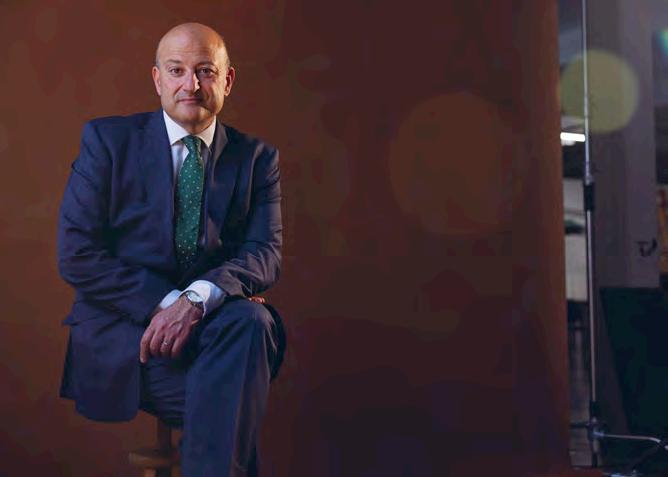
He has Geordie, the black and white cocker spaniel, who proudly adorns his phone screensaver, and a family holiday home near Wooler, in Northumberland, to prove it.
He’s also got a family tree whose roots twist and turn around decades in the region, from a grandmother who made wartime parachutes to a father, the late Lord Justice Taylor, who served as Baron Taylor of Gosforth and authored the report into the 1989 Hillsborough football stadium disaster.
“I always consider myself a Geordie, even though I've lived longer out of the region than in it,” says Louis.
“My father went to St James’ Park a lot when he was a boy.
“He talked about how Dickensian and crowded it was – that and the stench of stewed onions, which was a particular personal dislike.
"My mother, Irene Taylor, was born in Fenham, though her parent’s mother came from Belarus as a baby in 1908, when she was about a month-and-a-half.
“My grandparents went on to set up a clothing business on Westgate Road, which they built up through the 1930s.
“By the time conflict had broken out, they had a factory or two, which were converted to wartime production.
“My grandfather was with the RAF in West Africa, and my grandmother was making webbing and parachutes in the factories.
“She ran the business and would be the only woman on committees for the Ministry of Supplies, sitting in smokefilled meeting rooms drinking tonic or ginger, refusing to drink alcohol while others would have added gin or whiskey.
"After the war, they expanded the business and it became a huge supplier for Marks & Spencer.
“It moved to Team Valley, where they eventually had six factories, which they
sold in the mid-1970s.
“They built it from nothing,” says the former Newcastle Royal Grammar School chair of governors proudly.
He adds: “They developed the technology for mass production, using a jigsaw to cut layer upon layer of cloth into the shapes to sew; they had that kind of innovation.
"My sister knew some of the machinists, and I remember going to Team Valley as a kid.
“Not too long ago, my cousin drove around there and said one of the factories was still standing, and that you could make out some of the lettering.
“My grandmother set up business 100 years ago and, in a lot of ways, when you look at how much venture capital goes to female founders versus their male counterparts, it is amazing how little has changed, but also how much has changed.
“The different proportion of venture capital going to female founders is offensively low, and it’s not just about the injustice, it's a waste of commercial opportunity too.
“There's huge creativity under female
banners and minority founders, who also get a proportionately low percentage of venture capital, and it is something we're really trying to redress at the bank.”
Next year, British Business Bank, the Government’s small business funding institution, will launch its Northern Powerhouse Investment Fund II.
Nine regions are earmarked across the whole of the North, including three in the North East – County Durham, Tyne and Wear and Northumberland – and the £660 million pot will offer entrepreneurs, in particular, a range of commercial finance options with loans from £25,000 to £2 million, and equity investment of up
to £5 million.
The endeavour is intended to build on the successes of the bank’s existing regional funds, which have generated more than £1 billion of additional private sector co-investment and supported nearly 2000 companies.
“We've provided close on £250 million to businesses in the North East alone in our main financing programmes, and we’ve provided more than 1400 start-up loans up here too,” says Louis.
He says: “The investment fund has allocated another £200 million to North East debt, equity and micro-finance, and we have the Regional Angels Programme, which puts money into syndicates of angel investors and individuals that help service that sector and expand their ability to invest.

“And we have Fund Her North, which helps female entrepreneurs across the region.
“So we do support the North East, but we would love to do more.
“There are some great universities here, and we are strong in life sciences, renewable energy, agritech and clean technology, which is echoed across companies from Teesside to Northumberland.”
“The creativity in the North East is amazing,” says Louis, whose CV includes seven years as chief executive of UK Export Finance, senior roles in London and Vietnam with Standard Chartered Bank, and time with JP Morgan.
He adds: “There are so many examples; adapting oil and gas engineering to renewable energy, developing technology to take organic waste and turn it into sustainable aviation fuel.
"I visit these businesses, and I'm always exhorting my colleagues to go out, meet them and get inspired too.
"We'll make sure the fund managers from the new North East fund are based here – and that they're not just focused on Newcastle or Durham, but the whole region.
"We're getting out to a lot of businesses of different sorts, and we have separate debt, an equity fund and micro-finance
funds, managed separately.
“The intent is to get real reach and have real impact.
“It's not about helicoptering in money from Westminster, but landing it in a way that's appropriate for the local economy.”
The new fund, says Louis, covers a Northern English triangle from Cumbria to the Humber, which represents a wide net for the Government’s economic development bank that was established in November 2014.
However, Louis has already reached out to small businesses, and his work will continue over the coming months as the bank urges operators to come forward and claim relevant finances.

But there’s something else on Louis’ to-do list.
A career on the road, and with it time working for institutions across the globe, has given him the opportunity to, in his own words, give something back.
After all, he has history up here. And so
does his family.
“Maybe you want to take a part in your life which people might be proud of, and make sure where you come from is always improving?,” says Louis, who, after speaking with North East Times Magazine, was headed to Northumberland – “probably the best kept secret in the UK” – with wife Kate for a few days of relaxation.
He adds: “My father was a judge and barrister up here before the Hillsborough
inquiry, through the 1950s, 1960s and 1970s, and my uncle chaired the health authority too, so there has been quite a strong streak of public service in the family.
“And giving something back has been kindled again in me,” says Louis, who is a former chair of trustees for the charity Music in Prisons, which funds music education projects for ex-prisoners and is named in honour of his late mother.
When he does, it will build on his time at Royal Grammar School, and later as its chair of governors, which Louis describes as a “hugely rewarding” time.

He says: “The school went co-ed, and we set up a bursary scheme to assist those who were bright but didn't have the financial means to come to the school.
"When I first joined the governors at the school, we looked at the postal codes represented from the region, because a broad social mix is a really important part of a great education.
“Everybody in the region should have access to the best education, and I'm really pleased that social mix is still present at the school.
“Some might say Royal Grammar School is an ivory tower in the middle of Newcastle, but I think access through the bursary campaign makes it a beacon for aspiration.
"Some guys I was at school with were from incredibly modest backgrounds, yet the school gave them the aspiration, and the ability, to go to university and raise their sights to greater heights.
“I think a lot more people are returning to the North East now after university than when I was there.
“And that’s really important, because we must have a way of attracting people back to the region and keeping talented people here.”
EMG Solicitors
For more information about EMG Solicitors and its services, contact www. emgsolicitors. com, email enquiry@ emgsolicitors. com or call 0191 500 6989.
Pictured, above, Sarah Jackson, director in the firm's Court of Protection team and Darlington office lead

At the start of the year, leading law firm EMG Solicitors opened a base in Darlington town centre. Set in the newly-developed Coniscliffe House, on Coniscliffe Road, the hub added to its existing offices in Gosforth, Penrith, Manchester and EMG’s Durham headquarters, where the business was founded. Eight months on, lawyer Sarah Jackson - a director in the Court of Protection team - continues to develop her role as office lead. Here, the Darlington local explains how the team is working to become part of its local communities and support the lives of the people it works with.
www.emgsolicitors.com
@EMGSolicitors
“I was attracted to working at EMG Solicitors for many reasons but, in particular, I really admired their nationally-respected reputation for Court of Protection work, which is my specialist practice area,” says Sarah.
“As someone from Darlington, who went to school here and is now bringing up my family here, it seemed an obvious choice.”
The Court of Protection becomes involved when someone is unable to make decisions on their own behalf, with the court appointing a solicitor to manage that person’s property and affairs, and make decisions for their personal health and welfare.
EMG’s expertise in this area is highlighted through several accreditations with lawyers at the firm also becoming the first legal representatives to be certified to offer advice on health and welfare matters under the Mental Capacity Act 2005.
And even now they’re still among only a handful of accredited professionals with mental capacity expertise and experience of working with vulnerable people and their families in the North East.
As an award-winning Legal 500 law firm, EMG’s commitment to delivering exceptional client service, and investment in its people, is central to its success.
The last 12 months has seen turnover at the firm rise by 26 per cent, with an additional 35 colleagues joining the firm – which reached its ninth anniversary in February – in 2023 so far.
As part of its strategic growth plans, this year also saw the opening of the firm’s Manchester office.
From its starting point in Durham in 2014, to a team of 141 today, co-founder and managing director Emma Gaudern has always insisted that changing people’s lives – including those of EMG’s team, its clients, their families and their local communities – is why the firm exists.
Sarah adds: “EMG Solicitors has strong values and firmly believes in putting something back into the communities it serves.
“Darlington is no exception, and the firm runs its own charitable fund, in partnership with County Durham Community Foundation, to support grassroots community groups, donating five per cent of our annual profits.”
From each of its office locations, EMG Solicitors is proud to offer a range of services to clients that include Court of Protection, wills, trusts and probate, family, dispute resolution, residential conveyancing and commercial property.
EMG’s property teams have seen significant growth in the last 12 months, with 33 colleagues now servicing clients nationwide.
The residential conveyancing team has recently strengthened its client offering in Darlington with the appointment of three new colleagues, including licensed conveyancer Gillian Haines.
Sarah says: “I’m really looking forward to leading the Darlington office through further growth and supporting both clients and businesses across our region.
“Our base in Coniscliffe House offers us a fantastic opportunity to be central to the exciting developments that are taking place in the town centre.


“With the opening of Darlington’s Economic Campus in 2021, which houses staff from eight Government departments including the Treasury and the Department for Education, Darlington is certainly thriving, and we are delighted to be part of that.”
“There are plans to bring even more jobs to Darlington too and areas across the town are being redeveloped, including the station.”
Sarah adds: “These changes are making a massive difference to the area, and there’s a lot of buzz around town.
“It’s a great place to be and we’re proud to be here for the long term, supporting Darlington, our North East communities and beyond.”
The National Innovation Centre for Ageing is a global organisation supported by an initial investment from the Government and Newcastle University to help co-innovate – together with citizens and private and public organisations – services, technologies and products and deliver them to the market through innovative, ethical and sustainable business models.
Newcastle recently hosted the first City of Longevity Global Conference, bringing together city leaders, researchers and industry to consider the role of cities as proactive actors in suggesting and supporting healthier lifestyles for residents and visitors through day-to-day touchpoints. Here, the National Innovation Centre for Ageing (NICA) discusses its ambition to promote healthy longevity in the urban environment.
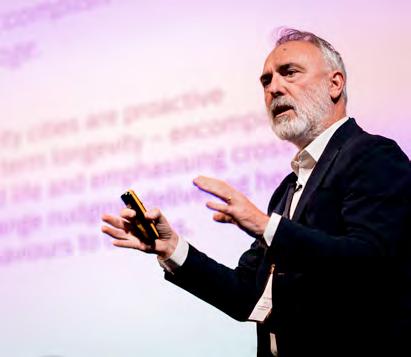
www.uknica.co.uk
@UKNICAofficial
People worldwide are living for longer.
Every country in the world is experiencing growth in both the size and the proportion of older persons in the population.
By 2030, one in six people in the world will be aged 60 years or over, and, by 2050, the number of over-60s will more than double to 2.1 billion.
This staggering global demographic shift can be attributed to scientific advancements in the diagnosis and treatment of disease, with the average human life expectancy increasing more in the last century than across all prior millennia of human evolution combined.
We are entering an unprecedented period in the human story, one where lifespans stretching to 100 years and beyond will become almost routine.
These events effectively mark the transition from an ageing society to one of longevity, where the first responds retrospectively to changes in the age structure of the population, and the latter seeks to exploit the advantages of longer lives through changing how we age.
Achieving a longevity society requires substantial changes in our behaviours and social norms across the life course to delay the negative effects of ageing.
In parallel to this societal maturation is another important demographic change – urbanisation.
For the first time in history, 2008 marked the year with more people living in urban rather than rural contexts and, by 2050, around 68 per cent of the global population will be residing in cities.
Taken together, the changes associated with ageing and urbanisation will impact all areas of society, from healthcare strain, retirement funding and social isolation, to infrastructure demand, urban sprawl and
social inequality.
At NICA, we are committed to helping local governments, planners and policymakers, as well as consumer brands and private businesses, prepare for –and proactively manage – the transition to a society of longevity.
This is what the City of Longevity is all about because cities, today more than ever, can play a decisive role in triggering and guiding the determinants that influence our health.
Given the multitude of challenges the world is experiencing, cities can and should do more than just implement emergency actions and policies; they need to see themselves as the proactive ‘champion of prevention’ and facilitator of citizens in the path to their healthy longevity.
The city is not an abstract entity or a simple urban or administrative concept.
It is an identity made by its communities – a daily
interface that interprets and connects human beings to services, to the environment and to one another.
Where better, therefore, than cities to embed longevity principles and create a new companion for citizens of all generations to make choices that lead to longer and healthier lives?
But what are these longevity principles of which we speak?
Evidence suggests most of the diseases we suffer from can be prevented or mitigated with simple actions, related mainly in the realms of education and behaviour.
It is what we like to call the tiny, huge things that seem not to matter much at the time but, over the course of the life span, can have serious consequences on our health and wellbeing.
It is making the decision to walk to work rather than driving, the healthy option at lunch rather than the fast food, a chat with a friend rather than scrolling social media.
Moreover, it is introducing healthy behaviours as soon as possible during the life course.
Experience and many studies have made it clear that will power alone, though effective for some, will not succeed for most.
That is why one of the most powerful concepts behind the City of Longevity is addressing all the generations instead of targeting – like other models – the older adults only.
This helps not only to create the ground to develop longevity policies, but also stimulate an intergenerational dialogue and narrative.
This is where cities can be instrumental by influencing positive behavioural change through existing infrastructure and day-to-day touchpoints.
A City of Longevity encourages citizen mobility, nutrition, mental and physical health in a non-intrusive way, and also uses digital technology and data-driven approaches to engage citizens and measure impact and progress over time.
Thanks to sensors, connected devices, crowdsourced data and the increasing capacity of software and computers, it is now possible not only to better design policies involving the citizens, but also to measure more quickly and accurately what works and change – on the job – what doesn’t.

This is what we hope to achieve through our City of Longevity toolkit – an open-source, dynamic and flexible model to allow urban stakeholders to design longevity
solutions that can then be measured and shared with other city managers, researchers and policymakers.
We have developed this in partnership with Stanford University’s Centre on Longevity and other international institutions, but the City of Longevity firmly belongs to us here in our home of Newcastle.
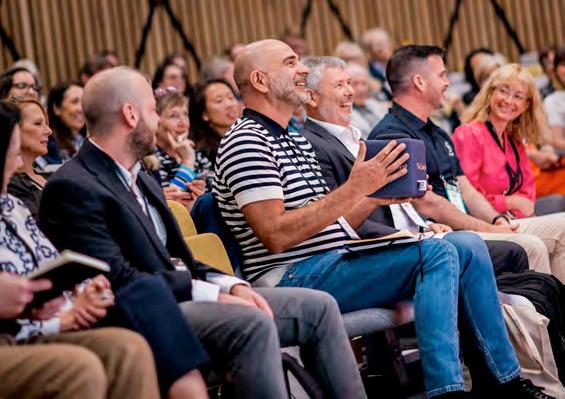
What we are really excited about right now is how we test and take forward our work in Newcastle and the wider North East.
And we want all agencies and organisations who deliver services, experience and value for residents and visitors to get in touch with us to see how we can collaborate.
Join us as we build cities of longevity, from Newcastle, for the world!
AonAon (NYSE: AON) exists to shape decisions for the better — to protect and enrich the lives of people around the world. Colleagues provide clients in more than 120 countries and sovereignties with advice and solutions that give them the clarity and confidence to make better decisions to protect and grow their business.
For more information, contact its Newcastle and Stockton teams on 0191 220 3333 or 01642 659300, respectively.
According to new research from Aon and Vitality, companies’ diversity, equity and inclusion practices risk being undermined by gender disparities. Here, Dr Jeanette Cook, Aon principal strategic consultant for health solutions in the UK, and Christine Wood, Aon head of office in the North East, highlight the value of diversity in the workplace and why strong wellbeing frameworks are critical to future success.
www.aon.com @Aon_UK
Analysis of new employee data from Vitality, in collaboration with Aon, shows key imbalances between genders at work in the UK, which, if left unchecked, can challenge firms’ diversity, equity and inclusion (DE&I) progress.
The findings come from a survey of more than 8500 employees in organisations across the UK to determine Britain’s Healthiest Workplace*.
According to the figures, men reported they were less likely to share the values of their employer (76.5 per cent versus 81.9 per cent for women) and felt more dissatisfied with their job than women (31 per cent to women’s 28.4 per cent).
There was a wide variance too between men (50.8 per cent) and women (33.6 per cent) when reflecting on whether their employer provides them with volunteering opportunities and supports them financially to do so.
Dr Jeanette Cook, Aon principal strategic consultant for health solutions in the UK, says: “There is a clear imbalance between genders across most metrics in this survey, with the data suggesting a lot of employers are not yet in the right place to manage the differences.
“Many studies have shown the benefits of having a diverse workforce, not least gains in productivity, performance, innovation and reputation.
“Companies cannot afford to be wrong-footed regarding gender variations in health and wellbeing needs.
“From a prospective candidate’s perspective, a future employer having a meaningful employee value proposition is an essential consideration when
choosing their next job.
“The balance for employers, then, is to ensure that DE&I and health and wellbeing programmes support retention and recruitment.”
Christine Wood, Aon head of office in the North East, pictured, above, is a firm believer in the power of a diverse workforce.

She says: “I think it’s easy to look for people with similarities to yourself when recruiting new talent, but I actively challenge myself to look for people who are nothing like me.
“The North East team is deliberately diverse; we’re cultivating a culture where everyone’s views and experiences are valued, and where everybody has an opportunity to grow.
“Some of the best ideas and innovations have come as a direct result of the diverse nature of our colleagues, and I will continue to be passionate about creating an environment where everyone feels empowered to bring their own unique perspective.
“As I see it, DE&I strategies are directly related to the success of the business and the success of our teams in our North East offices.”
Dr Cook adds: “A one-size-fits-all approach does
not work with health and wellbeing.
“Employers need to look at their own data in context with industry insights to gain greater understanding of the issues that are present within their workforce and to build resilience.
“While there are some basic and common wellbeing needs, to be most effective, organisations will need to develop flexible wellbeing programmes specifically tailored to their unique business sector and workforce.”

*Aon is the consulting partner to Vitality’s Britain’s Healthiest Workplace survey, which you can find at www.aon.com/unitedkingdom/employee-benefits/ britains-healthiest-workplace
To find out how Aon could help you build a resilient workforce, visit www.aon.com/en/about/building-aresilient-workforce
From recent Electoral Commission hacking to attacks on local authorities, schools, ambulance trusts and major employers including WH Smith, cybercrime is never too far from the headlines. Yet despite such high-profile cases, many businesses continue to operate without sufficiently strong online protection. Here, David Warren, sales director at Newcastle-based Melius Cyber, highlights the need for robust safety mechanisms, to not only guard against threats but pave the way for tangible growth.
www.meliuscyber.com
@MeliusCyber
Take a minute to think about your business’ objectives.
Among the many bullet points on the blueprint for growth, does one focus explicitly on cybersecurity?
If not, it should.
Because taking proactive measures to guard against IT attacks, through cyber certification, not only helps keep organisations and their data safe, but also increases their prospects of securing new work by strengthening their reputation as a trusted partner.
Cybersecurity certification is a simple, yet powerful, approach to unlocking substantial business growth.
And capitalising on the available benefits is in the best interests of all stakeholders – that’s why conversations about cybersecurity should always begin in the boardroom.
Cybersecurity certifications, which evidence implementation of controls, prove organisations have protected themselves from threats.
Notably, Government-backed Cyber Essentials and Cyber Essentials Plus are the most recognised cyber certifications in the UK, and these are often further reinforced with an information security management system, such as the internationally-recognised ISO 27001.
With this evidence comes a range of benefits, which will give you the tools to stimulate growth while handing you a plethora of opportunities.
How will cyber certification help me retain and win new business and expand my market reach?
The value of having excellent cybersecurity is
universally recognised across all industries.
A significant majority of medium and large businesses are making this a high priority, and it makes sense these organisations would prefer to deal with similarly secure companies that take cybersecurity equally seriously.
Medium to large businesses often evaluate the cybersecurity posture of their supply chain partners to minimise risk to their own operations.
Certification is a strong indicator of trustworthiness and credibility.

Many of these businesses have strict policies in place regarding cybersecurity and often employ compliance officers, which can prevent the signing of contracts if they identify your business as a risk to them, no matter how amazing your product or service is.
Indeed, certification enables organisations to apply for larger business contracts or tenders, and
bid through purchasing frameworks, which, without certification, would be closed markets.
Being able to evidence your business as secure often leads to winning contracts of higher value and expands your market reach.
Similarly, businesses shifting towards a cyber secure structure are unlikely to retain a contract with you if their evaluation shows you have not taken necessary steps.
Retaining contracts is crucial for upward growth within your business; lack of pre-emptive action can stifle this by signaling you are not a business to be included in a partner’s strategic plan.
Data breaches occur extremely frequently, often leading to stolen customer data and serious reputational damage.
Obtaining Cyber Essentials certification proves an organisation is focused on data protection.
Equally, by continually demonstrating dedication to keeping your customers safe, a business fosters a culture of trust and confidence.
Ultimately, data is an asset stakeholders have entrusted you to store.

Therefore, the responsibility of due diligence and good practice regarding the security of this information is on you.
Fulfilling this responsibility strengthens an organisation’s reputation and enhances relationships with customers.
Additionally, becoming certified allows employees to prove to customers that cybersecurity is a core value within your business.
This is a strong selling point, which enables the customer to feel safe and in the hands of a company that places their worth highly.
Furthermore, your employees will know their data privacy – as a member of your organisation – is respected.
If you hold no proof of caring about their data, what message does this convey to staff?
Certification enhances the trust and respect between employee and executive team.
There were an estimated 2.39 million instances of cybercrime in 2022/2023 across UK businesses, which only emphasises why every organisation should be
thinking about protection.
This is probably the very least firms should be doing in their first steps towards becoming cyber secure.
This is not something that only happens in statistics, this is a real-life issue with real impact on business growth.
Cyberattacks can put a halt on operations for extended periods of time, and in some cases, indefinitely.
The impact on profits can be debilitating.
It is commonly found that senior staff are only interested in cybersecurity after an attack has occurred, with the issue treated as a reactive measure, rather than the proactive one it should be.
Having a structure that allows for cybersecurity protection is vital for smooth business operations.
Certified organisations have taken the necessary steps to protect themselves and those they work with.
This significantly reduces the likelihood of an attack, as well as the impact of an attack should one occur.
And it is backed up by figures, with certified organisations 60 per cent less likely to make a claim on their cyber insurance.
Melius Cyber -
For more information about Melius Cyber, and how it could help your business stay safe against online criminal attacks, contact 0191 249 3003.
As final preparations are made for the unveiling of law firm Ward Hadaway’s latest North East Fastest 50 list, Steven Hugill speaks to partner and programme lead Damien Charlton about the value of showcasing companies’ successes and the campaign’s significance in helping shape future regional commercial advances.
plentiful headwinds and haze, Fastest 50 cuts through beacon-like, illuminating North East business resilience, innovation and progress.
Annually highlighting the half-century of privatelyowned regional businesses with the largest average annual turnover growth rates across a three-year period, Fastest 50 – which began in the late 1990s – is an almanac of accomplishment across companies of all sizes and sectors.
“There is a lot of hard work, focus, dedication, expertise and skill that goes into running a business, as well as a lot of trials and tribulations,” says Damien, who leads Fastest 50 alongside his role as a partner at Ward Hadaway.
www.wardhadaway.com
@WardHadaway
“The path to success is never easy for any business owner, which is why it’s so nice to shine a spotlight on their achievements.”
A smile spreads across Damien Charlton’s face, as warming rays of light stream through office windows over his right shoulder.
The sunshine, though, is software-generated, a video call backcloth providing perpetual brightness across even the greyest of British summers.
But it’s nevertheless an entirely appropriate scene, given the uplifting nature of Ward Hadaway’s North East Fastest 50 list, the latest iteration of which will be unveiled at an October ceremony.
In a world where the UK’s protracted EU divorce, COVID-19, Russia’s Ukrainian assault and financial market constriction have, over the years, created
“And that is why it’s so enjoyable to recognise companies’ successes.
“It’s perhaps part of the North East’s DNA to not shout too loudly about its achievements, but the firms that make the Fastest 50 list are the ones driving the region’s growth and making a huge contribution to prosperity, employment, training and graduate retention.

“We tell the stories people like to hear, the background to business growth and the many different journeys behind the entrepreneurialism.”
“And we cover a really diverse cross-section of sectors too, from technology to retail, leisure to engineering and many more,” adds Damien.
Those chapters are brought to life through a purely impartial process that twines publicly-available data from Companies House with verification of smaller firms’ abbreviated accounts to collate windows into companies’ respective financial worlds.
The 2023 list will be revealed at a Baltic Centre for Contemporary Art event, where – as in previous

years – awards will be handed to the small, medium and large firms with the greatest growth successes, before an overall winner is crowned.
“To qualify, a business’ growth must be sustained and sustainable, and it must be profitable,” says Damien.
“And it is a great feeling when you contact a company, which is all those things, and say it has made the list, having done so on an entirely objective basis.”
Satisfying too, says Damien, is the catapulting impact Fastest 50 has on the backbone of the region’s employment landscape - its small business community.

He says: “It’s wonderful to have companies, some who aren’t on many radars, appear on the list.
“While providing an opportunity for celebration, it also allows them to stand on a pedestal and shout about themselves as a successful organisation and employer of choice.
“It’s fantastic too for a scaling or familyled business to see its name up in lights alongside regular Fastest 50 firms like clothing company END, which has enjoyed stratospheric, sustained growth.
“And such is the draw now, that some
businesses write to us when they believe they’ve had a good year, because they’re so keen to be included.”
Equally important, however, says Damien, who joined Ward Hadaway in 2000, is the appearance of larger, more historic firms on the blue-ribbon list, particularly debutants or very recent inclusions, for they illustrate a desire to continue breaking new ground, rather than becoming static in the marketplace.
Referring to 1869-founded, employeeowned builders’ merchant JT Dove, which made its Fastest 50 bow in 2022 following a 136 per cent rise in pre-distribution profits, Damien says: “There are always new firms to the list, and some which are incredibly well-established but, for whatever reason, have never featured before.
“That was the case with JT Dove, which has been a part of the North East business community fabric for so long.
“It made Fastest 50 after launching a growth strategy that is continuing to deliver significant progress, and it was fantastic to see its name on the list.”
The insight, though, extends yet further, with the feats of END, JT Dove and many

“The awards are so important in shining a light on all the fantastic work businesses are doing in the region”Rich Snowdon Head of studio Coatsink Named the overall fastest-growing business in the North East for 2022 Right, Raman Sehgal, founder of international life sciences marketing agency ramarketing, addresses guests as keynote speaker during 2022's North East Fastest 50 awards ceremony
others providing a barometer of the North East’s commercial health, which, by association, works to catalyse Ward Hadaway’s client support.
Damien says: “The firms who do well provide an indication of the economy and which sectors have prospered amid often difficult circumstances.
“And that creates a bigger picture that
takes us from lawyers practising law to a team with much broader knowledge of regional businesses, sectors and the reasons behind their successes.”
Damien adds: “The best part of my job is getting to know companies, their people and why they are doing well.
“And Fastest 50 is a wonderful extension of that.”
“The awards are a breath of fresh air in this permacrisis period we find ourselves living through; it’s good to celebrate success and look positively to the future”
Paul Griffiths Managing director The Storage PlaceNamed the fastestgrowing small business in the North East for 2022
To be part of the North East Fastest 50 list, organisations must be:


• A private company
• Based in the region
• Profitable, have experienced turnover increases and recorded turnover of more than £1 million in each of the last three years.
Sarah Bentley is chief executive at Tandem, the Darlington-based charity providing tailored support to help people back into employment. Here, she tells Steven Hugill about its mission, the importance of service flexibility and how a recent name change is helping it push forward growth plans.

4Founded nearly three decades ago, Tandem provides skills, training and personal development guidance to around 500 individuals across Darlington and the Tees Valley every year. How do its frameworks help people find employment?
We help people in Darlington and the local area reach their full potential.
We particularly support people who are struggling to find employment, helping them gain skills and qualifications, and increase their wellbeing and confidence through positive experiences, so they have a wider choice of opportunities and earning potential.
Our flexible frameworks allow us to
tailor support to an individual level.
People need our help for lots of different reasons; it is much more than just gaining skills and qualifications.
We can provide training and access to accredited courses and qualifications, in a welcoming and positive space, and have strong connections with employers.
The world of work is constantly evolving, meaning employers’ skills demands are equally ever-changing. How is that reflected in Tandem’s support?
Our wide network ensures we stay up to date with the needs of employers and the barriers people face.
We are a small team, so we can adapt
our provision quickly, which ensures our support is dynamic.
Our flexible approach ensures we provide exactly what is needed by both employers and the people we support.
We became an accredited training centre a few years ago, meaning we can deliver a range of accredited in-house training, further increasing our flexibility to respond to changing needs.
As well as our base at Tandem Hub, which is our meeting and conference space, we work on an outreach basis from community venues across Darlington.
Our networking links with local and regional providers, organisations and employers mean we stay informed about what works well, so we can adapt our offer and help more people.
The organisation was, until recently, known as Morrison Trust. What was the reason behind the name change, and how will the new moniker support future goals?
We’ve loved being Morrison Trust, but we thought there was an opportunity to have a name and identity that made what we do clearer.
So, after 27 years as Morrison Trust, we are now Tandem and Tandem Hub.
Our new name came through a collaborative approach that involved our whole team, as well as participants and other stakeholders.
We chose Tandem because it works so well to describe what we do; we have two sides to our organisation – our projects and Tandem Hub.
We worked with design company Sail Creative on the rebrand and our new name, and we’re delighted with the results.
Our new identity feels authentic and really shows the values that drive what we do – inclusion, collaboration, valuing people and equality.
However, while our name and logo may have changed, genuine care and tailored support remains as important to us as ever.
Tandem has received support from Tyne and Wear Community Foundation’s Growth and Resilience Fund. What will that be used for?
We were fortunate in securing the funding to raise our profile and increase awareness of the support available through our projects.
We have some great, flexible space at Morton Park, which works well for companies and organisations to use for training, meetings, staff away days, conferences and exhibitions.
And all of the profit we make from Tandem Hub is reinvested back into the charity.
With the organisation set to celebrate its 30th anniversary in 2025, what does the next decade and beyond hold for Tandem? How do you plan to continue its successes?
We want to continue to be accessible and available to everyone in Darlington, becoming even more integral within the support network across the town by developing our relationships with local organisations.
We want to help more people have greater employment choices and deliver economic growth in Darlington.
We know many people are struggling with the impact of the pandemic, and we are seeing an increase in need for support around mental health, anxiety, worry and isolation.
Over the last few years, we have increased our support around wellbeing and we now hold regular relaxation sessions, with an arts and crafts group meeting every other week.
We offer a range of personal development sessions, including confidence building, assertiveness, anxiety and boundaries, and work with a trained counsellor.
It’s very difficult to think about moving into work if you’re struggling with these issues, so we want to continue to build on our holistic support.
Our focus over the next five years will be to increase access to our support, develop our links into communities and continue to recognise the importance of quality in all we do.
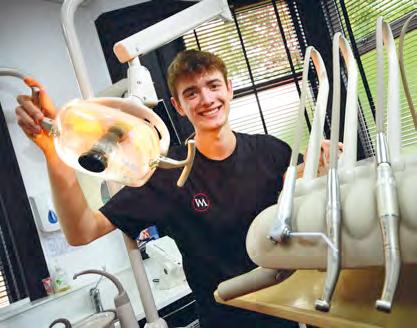
Having delivered dental apprenticeships for more than three decades, Northern Skills is well versed in helping learners get a taste for the sector. Here, Dawn Longmore, the training provider’s regional apprenticeship manager, and dental nurse apprentice Ben Woodland talk about the value of its courses in creating long-term careers.
www.northernskills.co.uk @northernskills_
Northern Skills
-
To find out more about Northern Skills’ dental apprenticeships, how they can support your practice or how to apply for a vacancy, visit www. northernskills. co.uk or call 03453 404040.
It’s a common misconception that if you’re interested in a career in the dental sector, you have to go to university.
In fact, you can get a start in the sector – and learn skills in a practice setting a lot quicker than you would at university – as an apprentice.
Northern Skills, part of Middlesbrough College Group, has been running dental apprenticeship courses for more than 30 years.
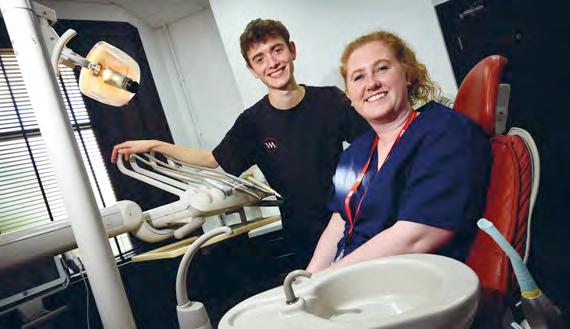
In excess of 200 students are presently working through level three dental nurse apprenticeships at Northern Skills, splitting their time between the classroom and the dental surgery, working at practices across the region.
Students can start from 16 with no upper age limit – some course members in the past have started apprenticeships in their 50s – and spend 18 months acquiring a wide range of skills.
Apprenticeships are fully Government funded, with no student fees, and apprentices earn while they learn, getting paid for all their time in class.
Dawn Longmore, Northern Skills’ regional apprenticeship manager, says: “Many nurses who qualify progress to areas including hygiene therapy,
general nursing, dentistry, dental nurse tutoring, practice management and lots more.
“It’s an excellent stepping stone to many roles.”
Ben Woodland is in the first year of his dental nurse apprenticeship.
The 20-year-old, from Bishop Auckland, says: “I wanted to do a job which helped people, like healthcare, and when I heard about the dental nursing course, I thought it was something I’d really like to do.”
Ben splits his time between learning in college and working at the Westmount Dental Practice, in Sunderland.
He says: “I’m really enjoying the apprenticeship.
“I spend four days a week in the practice and one day a week in college, and the combination is great.
“I enjoy going to college, but I find I learn even better with hands-on experience, spending time putting what I’m learning into practice, rather than just sitting in a classroom.
“There are lots of things to learn, but I’m supported really well by the tutors on the course and by the people in the practice.”
He adds: “At the end of the three years, I will be a qualified dental nurse and there are lots of different routes and options I can take from there.
“The course has opened up a whole load of possibilities for me – I’m so glad I decided to join it.”

Kelly Whitfield is an accomplished entrepreneur, strategist and sought-after media commentator on matters relating to employee engagement, recruitment and retention. Later this year, Kelly will launch KliK, her new digitally disruptive, industryspecific alternative to recruitment agencies, CV databases and job boards, as a licensed, SaaS product. Kelly also offers support with constancy projects and expert recruitment advice.
Contact her to find out more, or follow her social media accounts for latest updates on Klik.
Recruitment is a big deal. Such a big deal, in fact, that it is a £43 billion turnover industry in the UK. With experience in recruitment spanning two decades, Kelly Whitfield has seen all sides of the desk. Now a determined entrepreneur, she is focused on changing the landscape of recruitment with her innovative new platform KliK. Here, she talks about why it’s time for change.
www.linkedin.com/in/kellymwhitfield/ www.kellywhitfield.co.uk/
An accidental, unqualified profession
It’s fair to say the beginnings of my career in the recruitment industry align with it being, overall, an accidental, unqualified profession.
My recruitment career began by chance; having left the police force in my early twenties, I spent one year circumnavigating the globe.
I walked into a recruitment agency looking for a job, to buy me some time while I figured out what I was going to do next.
I ended up landing a role at that exact recruitment firm.
Through hard work, determination and a shameless competitive nature, I quickly rose through the ranks, gaining extensive experience in the industry before I was head-hunted by a leading global firm.
But one thing always played on my mind.
The recruitment profession lacked honour.
I loved my work, but I struggled to believe that what I was doing was doing good.
However, I believed wholeheartedly in one thing: that it could be improved.
The recruitment process is flawed.
Traditional recruitment is characterised by minimal consultation, transactional approaches and a focus on fees, rather than finding the right fit.
While I must stress there are many firms and recruiters out there doing a brilliant job, so many common problems are deep-rooted and are still evident now.
They include:
• Depth of consultation – The consultative approach, both with the employer and the candidate, is usually minimal. We must find out what the employer really needs, along with understanding candidates’ skills, behaviours and career aspirations in depth. Only by going beyond the job description can we accurately match a candidate not only to a role, but also to an employer.
• Flawed guarantee periods – It’s unethical for recruitment consultants to use any means necessary to convince a candidate to remain in a role until the guarantee period expires so they can retain their fee. All this leads to is disruption, delays and further recruitment expense.
• Focus on fees – Too many recruitment firms have a tunnel vision approach, with fees being the golden light at the end of it. Instead, aligning individual aspirations with business needs means candidates, who are the right personality and culture fit, can be placed.
To get recruitment right, the pressure isn’t just on recruitment agencies.
Businesses must understand their own culture and project this through their employer branding, to attract talent that’s the right fit for them.
Then, by monitoring employee engagement, turnover levels and seeking feedback, they can
ensure they do all they can to retain top talent.
Businesses also need to be mindful of shifts in candidate behaviour.
It’s evident that younger generations are purpose driven, seeking information about their respective employer’s environmental and community impact.
Many jobseekers are also prioritising flexibility and work/life balance in our post-COVID-19 society, which means being competitive as an employer is no longer just about offering the biggest salary.
Equally, I believe candidates should be encouraged to develop an understanding of the industry they want to work in, ensuring their career aspirations match their skills, behaviours and interests.
As a society, we’re not doing enough to facilitate this, which traces all the way back to educational institutions and the lack of careers advice available to those entering the labour market.
Building bridges between education, aspiration and employment: Introducing KliK
A bottoms on seats, money-centric approach to recruitment just doesn’t work.
It’s time to bring the focus back to people and connect education, careers, aspiration and employment.
These observations have fuelled my mission to change the industry for the better.
So, I’ve created KliK, a digital platform designed to inspire, empower and encourage businesses to take control and bring their recruitment in-house.
KliK acts as a bridge between education and employment, focusing on providing comprehensive, industry-specific careers advice to individuals.
The platform also enables businesses to engage directly with jobseekers, fostering a deeper understanding of culture fit and enhancing the overall recruitment experience for both candidates and employers.
After all, who in their right mind could genuinely commit to a vacancy when the identity of their potential employer is ‘our confidential client’?
Overall, the benefits are two-fold.
KliK provides support, guidance and training opportunities to jobseekers.
Simultaneously, it enables employers to attract the right talent though showcasing their mission and employer branding, thus enhancing their recruitment process.
Employers can leverage the platform to increase
engagement, improve service levels and gain a better return on recruitment investment.
Jobseekers benefit from comprehensive career advice, training opportunities and a sector-specific community within which they can connect with potential employers.
My aim with KliK is reconnection; an inch-wide, mile-deep approach, where people working within sector specific industries can connect.

With a candidate-centric approach, direct employer engagement and emphasis on inspiring generations, we have the potential to positively transform recruitment and skills, especially in such a candidate-driven market.
The end goal? Putting people back in the centre.
It will mean businesses can grow stronger, and mean employees can develop personally and professionally to have sustained and quality careers.
For more information about working at Muckle LLP, visit www.muckle-llp. com/careers
From reducing stress and sickness to improving mental health, the benefits of promoting fitness and physical activity in the workplace are huge. Yet, in today's fast-paced work environment, we’re finding ourselves sitting more and moving less. After a day of backto-back meetings, calls and deadlines, rest over exercise can seem like the only option. But with full-time workers spending around one-third of their day at work, it's becoming increasingly important businesses look for ways to promote and support healthy behaviours in the workplace. Here, leading law firm for business Muckle LLP talks about its successes and challenges in promoting healthy choices, and its long-term commitment to its people’s mental and physical wellbeing.
www.muckle-llp.com

@MuckleLLP
The workplace is very different from what it used to be 30, ten or even four years ago.
While many businesses still have a traditional structure, with people in the office five days a week, a lot have opted for a more hybrid approach, and some operate entirely remotely.
Muckle LLP falls somewhere in the middle, giving its people the flexibility to make decisions to work where best suits their needs and clients' needs.
Muckle's managing partner Jason Wainwright, pictured right, hopes this gives people more free time to spend on themselves, but worries that’s not always the case.
He says: “In an ideal world, time saved commuting would be used for doing something of personal interest like going for a walk, spending time with family or dropping kids off at school.
“But I work with lawyers and other hardworking people, and many have the tendency to slip into the habit of prioritising work over self-care.”
A recent survey by legal technology provider Clio backs this up, with two-thirds of lawyers saying they found themselves working longer hours due to flexible working, and working from home.
However, they also said their work/life balance has improved since the end of lockdown.
So what is the solution?
Jason believes employers bear some responsibility in tackling the problem.
He says: “If you look at the statistics at face value,
there doesn’t seem to be a problem.
“Employers are seeing more productivity from their people, and their people believe their work/life balance has improved.
“But overworking is overworking, and the potential for burnout is huge.”
The firm recently retained its ‘Maintaining Excellence Standard’ – the highest level of the Better Health at Work Award, a regional scheme recognising workplaces’
efforts to improve staff health and wellbeing.
It was also named ‘Best Place to Work’ in Northumberland and North Tyneside at the North East Business Awards.
Jason says the firm is always looking to improve.
He says: “We have lots of support in place, including 11 trained mental health first-aiders, including me and some other senior leaders in the business, and we provide two additional wellbeing days, in addition to annual leave, but there is always more we can do.
“Our business is changing all the time, and our wellbeing initiatives must evolve with it.
“We also have a real focus on fitness and improving physical activity.
“We know there is a big link between activity and its effects on mental health, but the nature of office work means we’re mostly sedentary when we’re at work, so we’re always looking at creative options that promote physical activity to our people.”
Regular physical activity is associated with lower rates of depression and anxiety across all age groups, and a study from the Department for Work and Pensions showed physically active workers take 27 per cent fewer
sick days.
To stay healthy, the NHS recommends adults should do 150 minutes of moderate-intensity activity every week, which can seem daunting, particularly if you prioritise ‘job over gym’.
Jason says: “We have more than 170 people working at Muckle, so there is going to be a vast degree of fitness levels and willingness to participate in physical activities.
“We take the view that some physical activity is better than none, so it’s about having a number of initiatives in place to suit everyone.
“We are currently producing a series of videos featuring our people, highlighting the ways they incorporate fitness into their busy lifestyles for National Fitness Week.
“There have to be options, and it has to be fun.
“We have our sports teams and our running club, and we also reward people with vouchers for moving more through YuLife, an app that tracks and encourages physical activity.
“More importantly, it’s about creating an environment and culture where people feel comfortable and encouraged to take time for themselves.”

resicentral®
For more information about resicentral®’s energy management and smart automation solutions, contact hello@resicentral. co.uk
A 900-unit deal between resicentral®, headline sponsors of Urban Living Festival 2023, and Charles Hope Apartments, raises the industry standard for energy management, building monitoring and apartment automation.
www.resicentral.co.uk
LinkedIn: resicentral®
www.sddesmithgroup.com
LinkedIn: The SDDE Smith Group
resicentral®, a leading property technology company, made an impressive impact at this year's Urban Living Festival, in Canary Wharf.

As headline sponsor of the event, resicentral® showcased its innovative energy management solution resiEMTM and resiAIRTM, a Wi-Fi based intelligent monitoring, control and sensing unit.
Both are designed to reduce energy consumption, save clients’ money, improve sustainability and provide valuable data insights.
Managing director James Baird and Dale Smith, chief executive of The SDDE Smith Group, the parent company of resicentral®, gave speeches, workshops and live demonstrations, which left a lasting impression on attendees and was reaffirmed by the securing of deals for more than 1000 units while at the event.
James and Dale kicked off the second day of the festival with a joint introduction.
Dale spoke of the acquisition of resicentral® and his pride in The SDDE Smith Group’s participation as headline sponsor of the Urban Living Festival for three consecutive years, underscoring the company's dedication to driving innovation and industry collaboration.
James spoke about the company's rapid growth, highlighting its ambitious plans, which include the installation of resiEMTM technology within 520 units in Leeds.
The resicental® cloud platform and resiAIRTM technology work together to give clients control over their buildings by monitoring and controlling individual apartments and spaces, which helps to improve energy
efficiency and the resident experience.
resiAIRTM uses state-of-the-art processing and sensing technology in a compact device that is about the size of a smoke detector.
The system includes features such as temperature setting limits and the automatic shut-off of lighting, heating and other circuits when sensors detect no occupancy in a given location.
The technology uses customisable rules within the platform's engine, making them adaptable to various actions.
resiEMTM is an energy management platform that compiles granular data across an entire property, breaking it down to each individual unit, benchmarking energy consumption and the estimated costs for power usage.
The platform provides real-time and historical reports on energy usage, which property owners can use to effectively monitor and optimise consumption patterns.
Stemming from discussions and live demonstrations at the Urban Living Festival, resicentral® secured a deal with Charles Hope Apartments to implement resiAIRTM and resiEMTM in more than 900 units across 17 locations.
By leveraging resiAIRTM and resiEMTM, Charles Hope Apartments’ property managers and residents will experience an evolutionary approach to energy
usage and optimisation, raising efficiency and sustainability standards.
Richard Maurin, chief executive of Charles Hope Apartments, says: “Charles Hope Apartments has chosen resicentral® as a technology partner across our UK portfolio due to the product's superior features offering our business a range of energy-saving and operational management benefits.
“Charles Hope's ethos is to provide unparalleled customer service; our commitment to lowering energy usage without impacting the customer sits alongside that.
“resicentral® offers a data-driven solution that allows us to do this, unlike any other product on the market.” resicentral® is committed to sustainability and ESG principles.
Through its innovative resiEMTM platform and resiAIRTM technology, the company compiles realtime data on sustainability practises, including kWh of energy, resident engagement and carbon offsetting.
It is clear resicentral®'s contributions will have a lasting impact on the property industry as a whole.
Their dedication to innovation, sustainability and collaboration sets a high standard for others to follow.
It is an exciting time for urban living, and resicentral® is at the forefront, shaping a future where technology and sustainability converge for the betterment of residents and communities.


Welcome to the latest instalment of VISION 2031, the campaign led by North East Times Magazine that sets a blueprint for how our region can stand at the vanguard of global industrial and economic progress across the next ten years.

 Words by Steven Hugill
Words by Steven Hugill
Here, in the fourth high-level roundtable event of the series, individuals from a number of leading organisations, as well as those from partner Northstar Ventures and sponsors Northern Accelerator, EY, Jackson Hogg, Lloyds Banking Group and Weightmans, look at the region’s future through the prism of skills, assessing existing pathways and highlighting the action needed to boost both graduate retention and the attraction of domestic and international talent.
SPONSORED BY:
THE PANEL INCLUDED:
Professor Carrie Ambler

Chief scientific officer, LightOx

Peter ThomasChief marketing officer, Northumbria University

Alasdair GreigDirector, Northstar Ventures




Giselle StewartStudio director, Creative Assembly North
John Smith
Director of partnerships, Royal Grammar School Newcastle
Gary ChapmanHead of North East region and director - industrials and infrastructure, Lloyds Banking Group

Alison GwynnChief executive, North East Screen




Founder and chief executive, Jackson Hogg
Sharon GrantDirector, North East Institute of Technology
Mike ScoularNewcastle office managing partner, EY
Dr Arnab BasuCo-founder and chief executive, Kromek

Director and head of environmental, social and governance, Corstorphine & Wright

John Duns (chair)
Chief executive, Magnitude Biosciences
Director, North East Times Magazine


Paul WighamPartner, Weightmans

Dr Tim HammondDirector of commercialisation and economic development, Durham University Project lead, Northern Accelerator

With mortar leaching between bricks in severe need of spirit level intervention, Boris Johnson gave his kneehigh creation one last thump with the butt of a trowel handle.
Never one to decline an opportunity for a head-turning soundbite, here he was in late 2020, announcing funding for retraining he said would build a bridge between the “pointless, nonsensical gulf” of university and vocational education.
In many ways, it was just another chapter in the Westminster Photo Opportunities 101 playbook.
Beyond the surface, though, lay something deeper.
The debate around skills, and associated programme and policy tinkering, has existed for perpetuity.
Yet the sight and sound of the country’s 55th Prime Minister acknowledging the disconnect between education – and therefore industry’s ability to suitably replenish talent lines – during the white hot heat of pandemic Britain was incredibly telling.

For it pointed to a realisation that in the new postCOVID-19 era of technological radicality and rapidly shifting sectors, the revisions of the past must be replaced by systemic change if the UK is serious about remaining globally competitive. And quickly.
Well, for all the promises made during Johnson’s brush with masonry, and the more recent pledges of present Downing Street incumbent Rishi Sunak, including his mission to teach maths to all until 18, Sharon Grant, director at North East Institute of Technology (NEIoT), said education and industry remain somewhat uncomfortable bedfellows.
She said: “There are a lot of language barriers; they don’t totally understand each other.
“To make change in education curriculum, it can sometimes feel like turning a tanker, while business is more like a speedboat – and the two often struggle to understand how the timeframes don’t marry.
“However, we are making progress; more people are now invested in the dialogue.”
Sharon received support from Dr Arnab Basu, co-founder and chief executive of Sedgefield-based radiation detection kit maker Kromek, who advocated the creation of a “smoother interface” between academia and industry.
Led by the region’s universities, Dr Basu said it would knit the realms of workplace and education more
tightly together, satisfying present-day industry demands while preparing the learning landscape for the roles of tomorrow.
He said: “Skills requirements are evolving all the time – jobs are being created today that didn’t exist five years back.
“That makes it very challenging for further education and the schools sector, but the universities are wellequipped to keep up.”
Alison Gwynn, chief executive at North East Screen, which develops and champions the region as a film and television production hub, cautioned of the need to close a gap between training provision and sector reality.

Referencing the broadcast sector, she said: “Further and higher education providers put on courses that young people want to go on.
“And that means we have a phenomenal number of graduates who aspire to be Hollywood directors and producers.
“But many of the jobs are not creative roles, with the majority being freelance – and that can be a challenge.”

Acknowledging notable pockets of progress, Dr Tim Hammond, director of commercialisation and economic development at Durham University, admitted “a lot more needs to be done, through a lot more joined-up work”.
Using the EU-funded Intensive Industrial Innovation Programme (IIIP) as reference, which has seen Durham, Newcastle, Northumbria and Teesside universities embed PhD research students into SMEs to help develop new products and services, he said: “Understanding what
businesses require is a key – and ongoing – challenge.
“IIIP has been incredibly successful, with something like 100 students going through the programme, and Procter & Gamble is managing another scheme wherein 30 PhD students from Durham, Newcastle and Northumbria universities are being trained, not for the company’s benefit, but that of the life sciences sector.”
“Different sectors have different problems around attracting and retaining talent.
“It would be nice to have supporting groups to help extend innovation and deliver pivotal moments”
–Dr Fozia Saleem“These kind of programmes work very well, and we need to look at how they can be built upon,” added Dr Hammond, who is also lead of the Northern Accelerator programme that helps turns research into real-world applications.
Peter Thomas, chief marketing officer at Northumbria University, said local and national administrators must be drawn further into the conversation.
He added: “It’s about a supply and demand balance.
“On the demand side, we need to ask what the priority skills and industries are, and what it is the North East is going to be famous for.
“But no organisation can do it alone – there needs to be a tripartite conversation between education, industry and Government about demand, so we can then fix the supply side.
“Supply is all about unlocking potential further downstream, but the North East’s participation in higher education is the lowest in the country.
“The challenge we face is raising aspirations in communities across the region, to get more on the supply side, who we can then shape and mould as we go forward.”
“We need to get people out of their insular system and integrate them more into the community. “Incentivising them to remain in the region beyond the burst of university time, be it through an internship or work with another company, takes them beyond the study bubble and makes them much more likely to stay”
A FUNDAMENTAL CHAPTER IN ANY SKILLS DEBATE IS EARLY STAGE LEARNING. BUT IS THE REGION ENGAGING SUFFICIENTLY WITH THE WORKERS OF TOMORROW TO SET CAREER SIGHTS FROM A YOUNG AGE?
Not too long ago, careers advice for many consisted of a brief sit-down with a teacher or tutor during the last chapters of secondary school life and a phalanx of glossy further education brochures signposting a route towards university.
Thankfully, today’s landscape is much more expansive. The resurgence of vocational training has begun to reset the dial, with increasing numbers of students pursuing passions that equally fulfil industry skills wishes. But, said panel members, the environment – certainly at the younger end of the educational spectrum –remains challenging, with some subconscious ideologies blinkering pupils’ career vision.
Using the construction sector as a case study, Karen Crowe, director and head of environmental, social
and governance at Darlington and Newcastle-based architectural practice Corstorphine & Wright, said: “Selling the industry to young people is really difficult because of out-of-date perceptions.
“At one end, you have architecture; that immediately makes people think of years at university, which many see as being out of their grasp.
“And at the other, you’ve got images of someone stuck out in the cold trying to lay bricks.
“But neither are accurate.
“The biggest groups of people who hold those perceptions, beyond students and their families, are teachers and those in the careers field, who don’t know where industry is going.
“And it’s vital we remove such stereotypes to widen participation.”
Dr Basu added: “You capture or lose a young person’s imagination at the very early stages of school.
“Training teachers is where we need to start.”
Sharon, who oversees NEIoT’s partnering with colleges, higher education and anchor businesses Esh Group and Nissan to deliver employer-focused, practical learning across the advanced manufacturing, engineering, construction and digital sectors, agreed.

She added: “If parents, carers, teachers and careers advisors don’t know what is on their doorstep, then we’ve
"The North East needs to concentrate on the sectors that physically have to be here – plug and play on the internet, in the post-COVID-19 landscape, means some don’t – but look too at the ones that are going to make the next cog, rather than the ones lubricating existing cogs”
–Mike ScoularHe said: “From working with various local businesses and leaders across numerous sectors and schools, we know many young people are not aware of the pathways out there.
“So we’re tackling it alongside industry, with things like robotics events and debate clubs, to help teenagers through the right doors at the right time.”
EARLY YEARS ENCOURAGEMENT IS JUST ONE PART OF THE SKILLS CONUNDRUM, WITH THE REGION FACING A CONTINUED BATTLE TO RETAIN HIGHACHIEVING INDIVIDUALS. HOW CAN THE NORTH EAST BETTER PRESERVE ITS TALENT POOL?
According to a recent study piloted by engineering and design firm Atkins alongside the Northern Powerhouse Partnership think tank, four in ten 16 to 21-year-olds expect to leave the North in search of better employment prospects.
Furthermore, when refined purely to 16 to 18-year-olds, the figure rises to more than half.
Yet for all its headline-grabbing numbers, the research – its North East insight made up of contributions from individuals across Teesside, alongside peers in Liverpool, the M6 corridor and West Yorkshire – came as nothing new.
Talent has been disappearing down the region’s metaphorical brain drain, to cities or the medical sector innovation ‘golden triangle’ of Cambridge, London and Oxford for a number of years, attracted by the lure of broader employment opportunities and better pay grades.
But, said Richard Hogg, founder and chief executive at STEM-focused specialist recruitment and outsourced talent services partner Jackson Hogg, great scope exists to not only refill the region’s pool, but keep it topped up.
Recalling his experiences on a graduate retention programme rolled out by former regional development agency One North East, Richard called for the proliferation of similar projects, saying they would help magnetise talent to employers and, ultimately, the region.
no chance of getting young people to understand the breadth of roles out there for them.
“It has to start at primary level, and for STEM (science, technology, engineering and maths) in particular, there must be regular touchpoints to embed the message – it can’t be done through wow factor, one-off events.”
John Smith, director of partnerships at Newcastle’s Royal Grammar School, took the discussion on, emphasising how early years ignorance can leave youngsters unsighted to opportunities.
He said: “The ‘Keeping the Best’ scheme rotated highachieving graduates around local SMEs and different companies, with the idea that, after four years and a breadth of experience later, they would stay in the region.
“And it certainly worked for me.”
“I don’t run a STEM business per se, but I think the sector has benefitted from me staying within it during that period of my life,” added the Newcastle University mechanical engineering graduate, whose Newcastle and Teesside-based business helps firms recruit staff for temporary posts through to executive-level positions.
Professor Carrie Ambler, chief scientific officer at Newcastle-based LightOx, which is developing lightactivated chemotherapy treatment for early-stage mouth cancers, concurred.
She said: “We need to get people out of their insular system and integrate them more into the community.”
“Incentivising them to remain in the region beyond the burst of university time, be it through an internship or work with another company, takes them beyond the study bubble and makes them much more likely to stay,” added Prof Ambler, who also teaches in Durham University’s department of biosciences.
Mike talked about EY’s partnership with Northumbria University on a three-year Chartered management degree apprenticeship, which he said “works really well” in nurturing “problem-solvers and storytellers” of the future, with Paul spotlighting Weightmans’ solicitor apprenticeship scheme.
Paul added: “People on the programme are predominantly local, with familial connections to the North East, and come with varied backgrounds that help tackle the socio-economic issues around law.

“And they don’t leave.”
EAST DOING ENOUGH TO DRAW PEOPLE FROM OTHER PARTS OF THE UK – AND THE WORLD – TO STRENGTHEN ITS SKILLS BASE?
For the North East to truly build the bank of skilled workers it needs to maximise its potential, Dr Basu said retention programmes must be matched by similar focus on attracting talent from beyond its boundaries.
To do so, the Kromek boss – whose company supplements its NETPark headquarters with bases in Pennsylvania and California – said the region must take a “20-year strategic view”.
Allowing the North East to be more clearly sighted against global competition, he said such a blueprint would also deliver much-needed clarity amid a fitful national political scene.
She was backed by Giselle Stewart, studio director at Newcastle-based video games maker Creative Assembly North, who championed the value of internships in helping students “bed into” the region.
Highlighting the Skills Investment Fund, which provided a 50 per cent subsidy towards graduate interns for up to a year across the games, visual effects, animation, film and television sectors, she said: “We do need to look at how we attract and retain people.
“The Skills Investment Fund was a successful model; larger companies doubled their numbers, there was 80 per cent retention and those who weren’t retained got jobs elsewhere in the sector.
“Such programmes are a great way to help build careers while bedding into a place.”
And Mike Scoular, Newcastle office managing partner at professional services firm EY, and Paul Wigham, partner at Newcastle-based law firm Weightmans, used company-specific examples to underline the intrinsic link between opening career doors at an early age and greater permanency within a region.
He said: “We’re not going to grow if we don’t have an active way of expanding our workforce, whether it is through internal migration or international immigration.
“Look at the big hubs that have emerged, like California, and those that are now emerging; they haven’t done so through local population upskilling alone.
“You do it by bringing in job creators and retaining them.
“And the primary way to keep people is to have good, well-paid jobs and a strong career pathway; people don’t move to a region because of one good job, they need to see other roles and scope for progression.
“We think we’re competing with Yorkshire and London, but we need to compete globally.”
He added: “Our expectations are often built on fiveyear political cycles, which means our strategies sit within much shorter phases than can be realised.
“But innovation and skills is like Test cricket; it isn’t T20, it is all about longevity.”
Richard echoed the call for long-term planning, pointing to infrastructure investment like the commitment made to establish the Northumberland-
based National Renewable Energy Centre two decades ago, which continues to act as a key conduit in the development of new technologies for the UK’s green revolution.
He said: “It was a very strategic decision to put a key wind test facility in Blyth.
“And if you look at what’s happened at Port of Blyth, and what has rippled out at places like Port of Tyne, with the arrival of Dogger Bank wind farm joint operator Equinor and the jobs being created, you see that strategy has been borne out.”
Alison added: “We must suspend any ideas that we can get things done in a short space of time.
“We need a long-term vision that everyone understands.”
Citing the boomtime in regional film and television investment, wherein landmark BBC expansion was recently augmented by plans from production firm Fulwell73 – led by ex-Royal Grammar School Newcastle pupil Leo Pearlman – to build an 8450-job studio on Wearside, Alison called for sector “cross-fertilisation”.
This, she said, would create clusters at the cut and thrust of industry, which would allow sectors to work with greater cohesion while better informing skills needs and demands.
She said: “We are in a massive period of growth – we’ve had the BBC investment and now have Fulwell73’s Crown Works Studios, which will be the largest of its type in Europe.
“My biggest shortage area right now is production accountants but, in three years’ time, it will be construction.
“But when and how do I cluster with those industries? The answer is I don’t.
“We need more genuine collaboration – when you have
Paul Wigham, centre, chats to Alasdair Greig, left, and Dr Arnab Basu
“To make change in education curriculum, it can sometimes feel like turning a tanker, while business is more like a speedboat –and the two often struggle to understand how the timeframes don’t marry.
“However, we are making progress” –Sharon Grant
that, you can achieve far more.”
Dr Fozia Saleem, chief executive at Sedgefield-based Magnitude Biosciences, which provides contract lab services aiding research across a number of life science areas, agreed.
She said: “Different sectors have different problems around attracting and retaining talent.
“It would be nice to have supporting groups to help extend innovation and deliver pivotal moments.”
“It is about sectors coming together and communicating,” added Giselle, who was previously awarded an OBE for services to the games industry.
“We must look at how we grow the region’s historically successful industries while nurturing others around them.”
THE NORTH EAST HAS MANY STRONG CONSTITUENT PARTS BUT, FOR TOO LONG, HAS SUFFERED FROM GEOGRAPHICAL FRAGMENTATION. HOW IMPORTANT IS A UNITED NARRATIVE WHEN SEEKING TO SELL THE REGION TO EXTERNAL TALENT?
Pictured, from left to right, Dr Arnab Basu, Peter Thomas and roundtable chair John Duns chat to Northstar Ventures' director Alasdair Greig ahead of the event


From the rise and fall of One North East to local enterprise partnerships, three combined authorities, two mayors, a forthcoming devolution deal for a portion of the region and a number of elected councils, the area’s political landscape is nothing if not complicated.
And, said roundtable members, such an excessive palette makes any attempts to paint a picture of the region for those in outside shires a difficult endeavour.
In its stead, they said the North East must cut through the convolution by telling a story that bounds the area as a single entity, rather than a siloed environment in apparent constant struggle with itself.
“The region has an identity issue; it needs to be solidified,” said Prof Ambler.
“We need to think more about the North East, rather than the places people identify with.”
Karen added: “The focus on education and skills is vital, but the perception of a place and its potential is equally very important.”
Mike introduced another angle, saying the North East must bring an end to inter-regional battles of “councils within ten miles of each other competing for business relocation”.
Alternatively, he called for the identification of fresh areas of industrial focus, which he said would add much greater potency to the region’s message and, ultimately, its reception by talent further afield.
He said: “The North East needs to concentrate on the sectors that physically have to be here – plug and play on the internet, in the post-COVID-19 landscape, means some don’t – but look too at the ones that are going to make the next cog, rather than the ones lubricating existing cogs.”
AND HOW IMPORTANT IS SUCH MESSAGING IN ATTRACTING THE EXTERNAL INVESTMENT THE REGION NEEDS FOR COMMERCIAL GROWTH AND, BY ASSOCIATION, TALENT EXPANSION?
Alongside a fractured geographical picture, the North East, by virtue of centuries’ old introversion, has never truly felt comfortable in extolling its success stories.
But, said Gary Chapman, head of North East region and director – industrials and infrastructure at Lloyds Banking Group, to lure the investment and the talent required to compete on a global stage, the region must shed such reticence.
Spotlighting its place within the renewable energy sphere, using BP’s plans for huge hydrogen production plants on Teesside as a case study, he said: “We need to be totally aligned around what we stand for.
“We can sometimes hide our light under a bushel in the North East, but we need to sell our story unashamedly, because the opportunity – through things like the transition to net-zero and decarbonising of the industrial cluster – is here and now.”
Alasdair Greig, a director at Newcastle-based investment house Northstar Ventures, looked towards next year’s North East mayoral election – which officials say will hand the victor as much as £60 million a year to boost adult education and skills in the north of the region – as a key factor in the need to amplify the promotional volume.
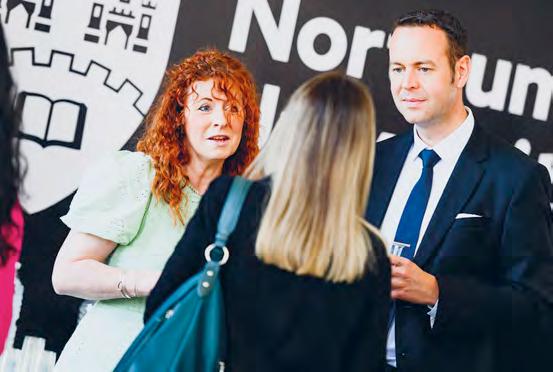
He added: “Funders, who are based in London or abroad, come with a low knowledge base of the region.
“So we therefore need to sell an exciting,
“Selling the construction industry to young people is really difficult because of out-of-date perceptions.
“And the biggest groups of people who hold those perceptions, beyond students and their families, are teachers and those in the careers field, who don’t know where industry is going.
“It’s vital we remove such stereotypes to widen participation”
–Karen Crowecomprehensive and united story.
“Manchester has done a fantastic job of selling its story, thanks to Andy Burnham as its mayor.
“We’re not as good at selling our story, but devolution provides an opportunity to bring together an ambitious narrative.”
Gary rejoined the conversation, highlighting the value of such storyboarding in catalysing awareness of businesses and their pioneering potential, and, therefore, their ability to help the region create, retain and attract talent.
He said: “In the South East, there are a lot of people who’ve come out of business and have human and real capital to invest in companies.
“That gives firms life and oxygen to grow to a point where a bank or mainstream funder can get involved.
“The North East doesn’t have an ecosystem on that scale, and it’s therefore important we shine a light with other early-stage investors.
“The quality of university research in this region is outstanding, and it needs to be met with capital; that’s how you get the next Silicon Valley.”
Reiterating the need for a collective voice, Dr Saleem added: “The North East has fantastic potential – but there isn’t enough shouting from the rooftops.
“Our external showcasing is missing; we have lots of internal, self-congratulatory events that are brilliant for morale, but we need to create more publicity outside the region.
“We need to highlight our strengths better and jump on the coattails of things like the rising awareness of Newcastle United, which we can use as conversation starters when seeking to attract and retain people.
“We’re at the crux of the North East going on to do amazing things, and we need to talk more about them.”

Newcastle International Airport
Flights are available from Newcastle International Airport to Frankfurt. For further information, visit www. newcastleairport. com


Frankfurt is the perfect place for a city getaway, with the hustle and bustle of the financial district perfectly complementing the slower pace of the old town and the idyllic riverbank. With picturesque streets, historical landmarks and cultural experiences aplenty, the destination delivers an exciting itinerary for any traveller. Here, Newcastle International Airport provides insight on how to spend 24 hours in the city.
www.newcastleairport.com/our-destinations/discover-the-world/frankfurt/ @NCLairport @visitfrankfurt
Frankfurt is among many European cities that have spent decades sympathetically reconstructing historic buildings and landmarks devastated by warfare in the last century. The Dom-Römer Quarter is Frankfurt’s ‘new’ old town, which opened in May 2018 to restore some of the city’s architecture. The development includes 20 new buildings and 15 replicas and is a unique way to experience a city’s original settlement, perfectly restored to reflect times gone by. You will find endless cafés, shops and museums to explore.
As you wander through Dom-Römer, look out for landmarks such as Grosser Engel, the home of Frankfurt’s first bank in the 17th century; Römer, Frankfurt’s city hall; Römerberg, the historical market square; the Old St. Nicholas Church, a medieval Lutheran church; and Frankfurt Cathedral, officially the Imperial Cathedral of Saint Bartholomew.
The walk along River Main offers the iconic view of downtown - dubbed Mainhattan for its impressive architectural skyline and its reputation as a financial and economic capital for Europe. Walk over the Eiserner Steg, a footbridge adorned with padlocks that provides a picture-perfect spot for a photo.
The Kleinmarkethalle boasts more than 150 market stalls, with locals selling produce and cuisine from every corner of the world. With something for every taste, you can sample local dishes to eat on-the-go, or to take home with you.

Visit the Main Tower to see Frankfurt from a height! At 200 metres tall, the rooftop observation deck offers panoramic views over the city, and a unique way to spot landmarks from above.
Alte Oper is a cultural landmark not to be missed on your tour of the city. Set against the vibrant backdrop
of the financial district, and behind its historical façade, Alte Oper is host to some of the most significant events in Frankfurt, including gala dinners, international congress and high-profile press conferences. And on your visit, catch an exciting musical performance in the impressive Great Hall.
Time to unwind
Frankfurt has many well-loved bars and restaurants for you to explore, and the city comes to life at dusk.

A popular local tipple is apple wine, which can be enjoyed at the city's traditional apple wine pubs, served in an earthenware jug.

Business Durham -
For more information about NETPark and the next phase of its expansion, call 01740 625250.
Pictured, from left to right, are Darran Snarr, Kier senior project manager; Councillor Amanda Hopgood, Durham County Council leader; and Ray Browning, North East Local Enterprise Partnership senior programme manager
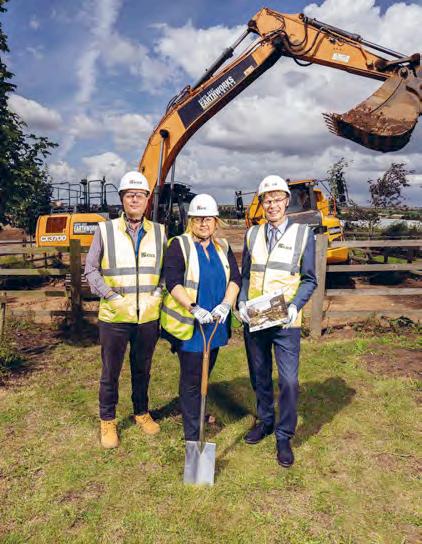
A County Durham science park home to companies at the forefront of global medical and technological advances is to grow larger. Durham County Council has kicked off a third development at NETPark, in Sedgefield, which it says has potential to create as many as 1250 jobs and pump hundreds of millions of pounds into the local economy over the next decade.
www.businessdurham.co.uk
@_BusinessDurham
www.northeasttechnologypark.com/
Work is underway on a £61 million expansion of one of the UK’s premier science parks following a contractor’s appointment.
Led by Durham County Council, the development of phase three of The North East Technology Park (NETPark), at Sedgefield, has begun, after Kier was chosen to deliver the project.
The county council is funding the expansion with support from the North East Local Enterprise Partnership.
Phase three has the potential to create 1250 skilled jobs and be worth £625 million to the local economy over the next ten years.
Plans are also in place for a fourth phase of NETPark – with potentially more to follow – with additional land designated for development that would take the number of jobs at the site to between 3000 and 4000.
Home to 40 companies including Kromek, Filtronic, IBEX Innovations and PolyPhotonix, NETPark – which opened in 2004 – provides space for firms that employ more than 700 people across specialist sectors such as advanced materials and manufacturing, x-ray technology, semiconductors, defence, electronics, photonics, robotics, pharmaceuticals and space.
Councillor Amanda Hopgood, council leader, says: “It is really exciting to have started work on the third phase of NETPark and to have appointed Kier to deliver the project.
“We are delighted to be making a significant investment in the expansion and grateful to the North East Local Enterprise Partnership for its support, which is in recognition of the fantastic employment opportunities that NETPark presents our region.
“The prospect of the further 1250 skilled jobs worth £625 million, and the potential for NETPark to
ultimately host 3000 to 4000 jobs in total, is proof we are delivering on our ambition to create more and better jobs for our residents, as set out in our Inclusive Economic Strategy.”
The new phase of what is the region’s premier science park will include up to 232,000sq ft of new laboratory, office and production space, and will cover an initial seven hectares of land, rising to 16 hectares.
It will also provide facilities for both existing tenants to expand and to enable future inward investment.
As well as the potential 1250 new direct jobs, the expansion stands to provide an additional 2200 in the supply chain.
Skilled jobs will be created across a broad range of specialties, from scientists and technicians to
administration, accounting, marketing, IT and logistics.
In addition to the council’s investment, the North East Local Enterprise Partnership is providing funding that will enable sustainability and low-carbon measures in phase three.
This is on the back of a previous Local Growth Fund grant, also from the North East Local Enterprise Partnership, which allowed highway infrastructure to be put in place to open up the land for development.
Lucy Winskell, North East Local Enterprise Partnership chair, says: “NETPark has undoubtedly been one of our region’s biggest economic success stories.
“Home to three national innovation centres, as well as a community of science and technology companies that have helped grow key sectors across the North East, NETPark has proven its ability to secure investment into our region and create jobs.

“The expansion of the science park will bring further business growth to the North East and create more than 1000 highly skilled jobs in emerging and growing sectors of industry, including health and life sciences, space, engineering and technology.
“The North East Local Enterprise Partnership has supported the growth of NETPark through the Local Growth Fund since 2015, and this latest investment has ensured work can now progress on phase three, helping to deliver more economic growth and more jobs for the
Pictured, above and below, artist's impressions of the expanded NETPark
The appointment of Kier to deliver the expansion builds on work by the company as pre-construction partner.
Daniel Doherty, regional director of Kier North and Scotland, adds: “This is an exciting project, which represents the ongoing importance of the North East as an area of growth for us, as well as our commitment to delivering outstanding projects in the science sector.
“We are looking forward to delivering a project befitting of Durham County Council’s vision and which will leave a lasting impact on the local community for years to come.”
Development of phase three is expected to be complete by early 2025.

Perspective Financial GroupOperating from more than 30 bases across the UK, including sites in Newcastle, Darlington and Harrogate, North Yorkshire, Perspective’s local offices provide financial planning advice on matters including retirement, later life and long-term care planning, inheritance tax, investments, protection and corporate planning.

If you would like to speak to a member of the Perspective team, call 0191 217 3340, 01325 289400 or 01423 810210. All calls to and from our landlines and mobiles are recorded to meet regulatory requirements.
From algebra to capital cities, history, physics and Shakespeare, we can all remember the varied topics we studied at school. But how many of us can recall learning about finances? Thankfully, things are changing, with curriculums flexing to focus on budgeting, pensions and managing incomes, and increased technology also helping make money matters more understandable for the younger generation. Here, Trevor Clark, pictured, below left, Chartered financial planner and director at Perspective (North East), reflects on the evolving landscape, highlighting further ways you can leave an economic legacy for your children.
www.pfgl.co.uk
@perspectivefgl
No financial taboos at the breakfast table
Money and politics are often taboo subjects for many of the older generation.
However, we are entering a new era of discussion, and the breakfast table is the perfect educational platform.
We know children and young adults are inquisitive, and encouraging them to ask questions and become conscious of financial matters at an early age is very important.
A simple savings account will encourage them to value money, look to the future, gain a sense of satisfaction and, to a certain degree, provide independence.
And there are tax-efficient wrappers for youngsters too, most notably junior ISAs.
It’s never too soon to provide a strong grounding for the years ahead.
According to a recent study, 38 per cent of parents say their families didn’t sufficiently educate them on investment matters.
But we learn more from our mistakes than our successes, particularly in finance, so surely it makes sense to discuss these ups and downs with our children?
If they learn from our financial successes, that’s great.
However, if they avoid our worst financial
misfortunes, while still being able to learn the lessons of experience, this provides the best of both worlds.
Leaving your children with a level of financial awareness is excellent, but an open and honest approach to money could be even further reaching. Encouraging your children to be transparent with their offspring creates a cascade of financial knowledge, as well as life experiences.
Teaching early: 50 per cent of parents with children aged ten or above have already begun teaching them about investing*
We can advise and help where required, or become a sounding board for ideas and investment plans. Why not involve your children in some family financial decisions?
Setting them simple spending-related tasks will make them appreciate and understand the value of money.
Furthermore, it will provide them with a sense of achievement, create aspirations for the future and give them a financial voice.
Most importantly, encourage them to respect money without fear and understand their needs
and wants, as well as highlighting the long-term consequences of good money management.
Once they learn these factors, it makes our role that much easier.
*Findings taken from a study by investment guidance platform The Motley Fool. For more information, visit www.fool. com/research/ parents-kidsinvesting
Young adults today often have a refreshingly unfettered outlook on life and the ability to come at different subjects from very different angles.

The continued roll out of technology is increasingly bringing finances to the masses, and certainly to the next generation.
Maybe, in this changing world, we can use our
discussions to learn from them too?
Next time you take a break or have a few moments to yourself, sit back and ponder this scenario.
We strive to pass our physical wealth to our children, yet often take a lifetime of experiences to the grave.
The combined value of these experiences will far outweigh any inheritance material and financial benefits.
This is why open and frank discussions are so important.
What better way to introduce your children to finance than speaking to your financial planner?
A gradual introduction to savings plans, investments and pensions will only bode well for the future. And we would be happy to help.
Custodial investment accounts are used by 26 per cent of parents to educate their children about the value of financial management*



Newcastle United has announced plans to create a fans’ zone in Strawberry Place, which will see the area across the road from St James’ Park finally embraced by the club’s owners, rather than sold to the highest bidder for flats and offices. However, the development also marks the return of another big player to Newcastle. STACK will be back after a short hiatus following the end of its tenure off Northumberland Street last year. The innovative project, converting industrial containers into two-storey restaurants, bars and street food vendors, complete with live entertainment, has also gone down a storm on Seaburn seafront. And those containers are now becoming familiar sights across the country, with units primed to crop up in Durham, Bishop Auckland, Whitley Bay, Middlesbrough, Carlisle, Lincoln and Northampton. And, as Neill Winch, chief executive of STACK’s parent company Danieli Leisure Group tells Colin Young, the expansion is set to continue across the UK.
Words by Colin Young

4 Neill Winch takes in the view from the second floor of STACK Seaburn.
To his left, beyond the main road, a stunning view of white sands, a shiny North Sea and blue horizons; to his right, restaurants and bars coming to life in a village of 20 stacked containers wrapped in equally shiny blue.
This is the beating heart of Seaburn seafront’s revival.
It is mid-morning and relatively quiet.
Above the hum of music, the many vendors across the two storeys are preparing for lunch.
In the middle of the floor, high above seats, tables and the main stage, painter Mick applies a fresh coat of metallic aquamarine.
Like the Forth Road Bridge, STACK exteriors and interiors require daily upkeep and attention.
And they will soon be applying paints on these unique metal emporiums across the country, as STACK rolls out expansion plans.
Neill says: "The opening night, I remember standing here, by the side, on my own.
“It was full, everyone was having an amazing time, and I looked down and thought, ‘what a great job we've done’.
"You just get a buzz out of giving people a great time; that’s what it’s all about.
“If they are enjoying it, we'll do well.
"I can’t tell you how many people said Seaburn would never work; when I was going through negotiations, so many told me that.
“But it made me even more determined.
“It has worked, and it has gone way beyond our expectations.”
Neill adds: “It was the same feeling on opening night in Newcastle; that was a £2.4 million investment and a brand new concept, but would it work?

“I had to go with my gut that it would –and it did.
"I know the brand and the model are unbelievable, and I have absolute faith.
“We could lift this, put it anywhere and
fill it.
“It's not easy, but we're giving people what they want."
Born in Sunderland, brought up in Newcastle and educated in Washington, Neill has worked in London, South Africa and Israel.
He’s also been involved in businesses across the North East for three decades, with his CV including an accountancy practice, flower shops, a coffee shop, a security business, property development, leisure, a care business, a nursing home and providing domiciliary care for 27 years in Newcastle.
STACK evolved in 2017 after a successful three-month stint serving warm drinks, mulled wine and beers over fire pits outside Newcastle’s Central Station in Hadrian’s Tipi.
Plans to make the cosy tent permanent were thrown out, but the popular tipi returned for a couple of the city’s Christmas markets before becoming a central component of Containerland when STACK opened.
Neill says: “We had one bar in a container and a bar in the tipi, and it evolved from that.
"We had a gin garden, tipi, street food and a stage, and when the live performances and stage were put in,
STACK went like that,” says Neill, sending his right hand skyward.
“People love live entertainment.
"It was not just me, other people contributed, and by luck and good judgement we ended up with a format that really worked.
“We massaged the model until we got it right.
“The last bit was the live music.
“We have to have that at every venue, 52 weeks of the year.
“That was the 'light came on’ moment.
“When we put the stage in, it was a different animal.
"The location was the worst end of town; the old Odeon cinema. Nobody went, there was no day or night-time economy.
“We changed the flow and footfall from Bigg Market and Grey Street, moving them over to us.
“We had to work hard – it took six months but, once we went through that, it gathered momentum.
“We had 1.3 million visitors in that first year.”
Newcastle’s soon-to-be HMRC office block put an end to STACK in Newcastle, but the familiar containers will return in the new Strawberry Place development, and are certain to be centre of attention.
Despite the sceptics, STACK Seaburn has also been a phenomenal success, and has not gone unnoticed elsewhere.
Neill says: "Newcastle was very successful, and Seaburn has been as successful in a very different way.
"This is not the city centre, but it is very much a destination and we have to drive footfall, whereas in Newcastle it was more organic and people came because it was the city centre.
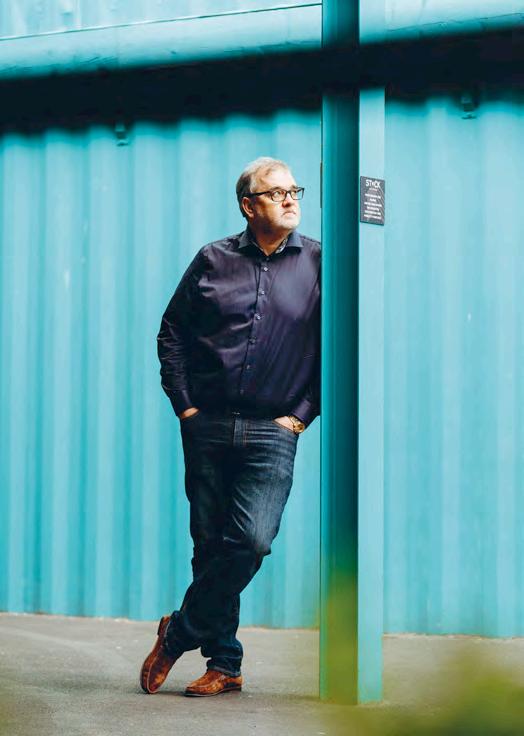
“But you have to work really hard here, and we do work really hard, but people only come back if they like what you do.
“If it's crap, they won’t come back.
"Kids entertainment, quality of food, quality of service, social media, digital marketing – it isn’t just a case of rocking up, opening up and people just turning up.
"I have an unbelievable team behind me – the best – who are very, very good at what they do.
“Unless you have everything right, things don’t happen. It's a massive operation behind the scenes.
"You'd be amazed how many people know STACK and are looking at it; people all over the country know what we have achieved in Newcastle, in particular.
“It's pretty spectacular for what we do. We're a huge success story."
The team behind the scenes is expanding as STACK branches out, taking enquiries from cities keen to develop an abandoned Argos or Debenhams store, while also adding to the portfolio across the region.
It's a diverse list of permanents and
pop-ups; the old Marks & Spencer building in Durham, underneath the A66 in Middlesbrough, a new-build scheme in Bishop Auckland, an old shed behind Spanish City, in Whitley Bay, and a car park in Carlisle.
And, as North East Times Magazine was going to print, Neill and the team were signing off on a site in Northampton, which will become STACK's first venue in the Midlands.
And, as in Newcastle and Seaburn, local chefs will have the opportunity to test the tastebuds of the public and follow in the footsteps of Sushi Me Rollin’, a small joint launched in STACK that is now serving some of the best Japanese food in town from its Grey Street base.
Neill says: “That’s a success story.
“I was disappointed when they left, but
also really pleased because they did an amazing job for me and the STACK brand.
“It feels a bit like one of your kids leaving home. They are good guys.
"The quality has to be right, and we encourage people to get on the ladder and develop their product with us.
“As long as the food is great and they are passionate, why not?
"We want them to be local, so they might have a similar feel.
“The independent street food will have that local touch and it’s the same with entertainment, so each STACK should be a slightly different experience.

“The ethos is the same, but they all have characters local to their environment.
“It adds kudos as well because they drive footfall.
“It's like a family.”
4Congratulations on your appointment as Laminform’s general manager. What does your post entail and what are you looking to bring to the role?
My position centres around dealing with the dayto-day running of the business, covering aspects of manufacturing, sales, procurement, administration and personnel.
I also ensure client quotes, orders and deliveries occur on time, and that work flow is progressive.

The business is evolving, and the new management team is helping to create a more fluid structure, enhancing quality and delivery.
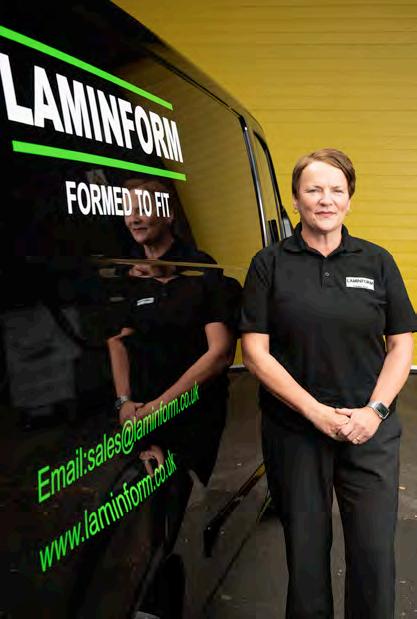
We have team meetings to ensure all aspects, from product specification to delivery, are maximised and consistent.
You’ve been a part of the business for 30 years, latterly as office manager. What changes have you seen over that time, and how much are you looking forward to helping shape the company’s future in your new role?
I was initially brought in for general administration duties, typing quotes/letters for directors before the days of computers – we had one electric typewriter.
I then progressed to purchasing materials, liaising with customers and running installation works.
Oh, how time has changed!
Having worked for the company for more than 30 years, I’m excited about the next phase of growth with enhanced technologies and capacities.
Working with new owners, we will be looking at expanding our product range and increasing volume on current ranges using integrated technologies, such as BIM.
Stable and controlled business growth is the plan, and our new investments will help to facilitate such growth.
There are exciting times ahead.
Laminform’s recent order book includes a project with Newcastle United and work to help fit out Sunderland’s revamped rail station. What do such headline schemes say about the company’s
reputation, and what does it mean to the business to be so active in its home region? Doing local work, especially prestigious contracts, is great recognition for the company.
We employ more than 20 people, all of whom have worked here for a long time, which makes for a great team, knowledge and capacity.
The business is now ready to start growing again after COVID-19, and we have two-year and five-year plans to progressively increase sales and market share. Traditionally, we have focused on working locally. However, our new webpage and direct buying capacity should help our growth.
As with any business, we would be nothing without our valuable clients, and we never take for granted the repeat work they provide.
Our loyal clients are always our priority.
Closing this month’s issue of North East Times Magazine, Julie Pickett, recently-appointed general manager at Hebburn-based washroom system and cubicle maker Laminform, talks about her new role, the company’s growth ambitions and its pride at supporting headline local projects.
